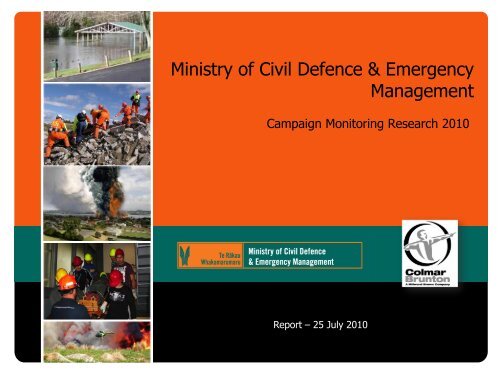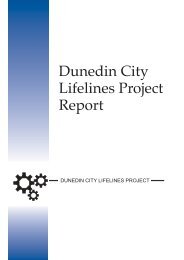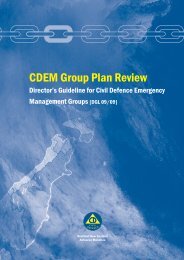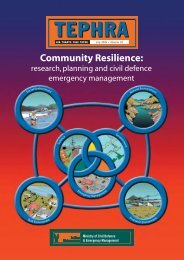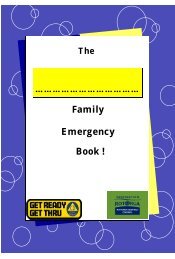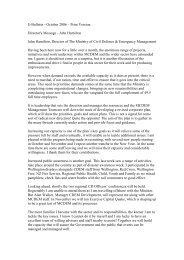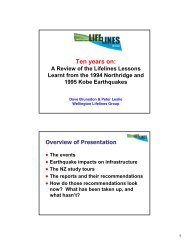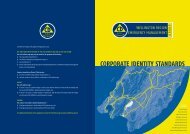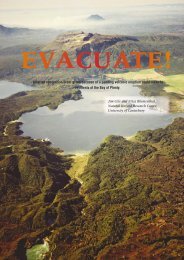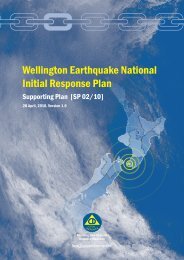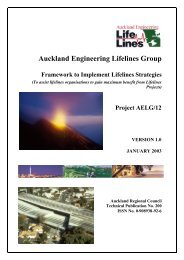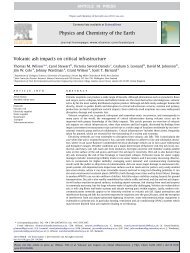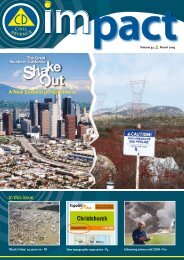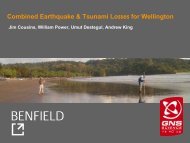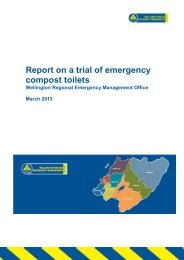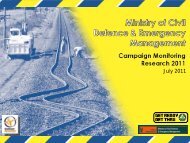Prepared at home - Ministry of Civil Defence and Emergency ...
Prepared at home - Ministry of Civil Defence and Emergency ...
Prepared at home - Ministry of Civil Defence and Emergency ...
You also want an ePaper? Increase the reach of your titles
YUMPU automatically turns print PDFs into web optimized ePapers that Google loves.
<strong>Ministry</strong> <strong>of</strong> <strong>Civil</strong> <strong>Defence</strong> & <strong>Emergency</strong><br />
Management<br />
Campaign Monitoring Research 2010<br />
Report – 25 July 2010
Background <strong>and</strong> objectives<br />
Background<br />
• The <strong>Ministry</strong> <strong>of</strong> <strong>Civil</strong> <strong>Defence</strong> <strong>and</strong> <strong>Emergency</strong> Management needs to shift New Zeal<strong>and</strong>ers‟ level<br />
<strong>of</strong> preparedness for disasters.<br />
• The Get Ready Get Thru social marketing campaign began in June 2006 <strong>and</strong> has now been<br />
running for four years.<br />
• This survey builds upon a previous April-May 2006 pre-campaign benchmark survey, <strong>and</strong> three<br />
annual tracking surveys conducted in April-May 2007-2009.<br />
Objective<br />
• To measure people‟s disaster preparedness, <strong>and</strong> to assess the effectiveness <strong>of</strong> the campaign<br />
over time.<br />
Methodology<br />
• R<strong>and</strong>om telephone interview (n=1000, aged 15+).<br />
• Fieldwork 12 April to 11 May 2010.<br />
• Maximum margin <strong>of</strong> error <strong>of</strong> +/- 3.1% <strong>at</strong> the 95% confidence level.<br />
• Methodology is the same as th<strong>at</strong> used in the benchmark <strong>and</strong> the three annual measures.<br />
2 2
Executive summary<br />
Disaster preparedness – How prepared are New Zeal<strong>and</strong>ers?<br />
– Overall, New Zeal<strong>and</strong>‟s st<strong>at</strong>e <strong>of</strong> preparedness remains rel<strong>at</strong>ively stable, although there has been an<br />
upward trend since the start <strong>of</strong> the campaign.<br />
– Forty five percent <strong>of</strong> New Zeal<strong>and</strong>ers say th<strong>at</strong> in the last 12 months they have taken steps to<br />
prepare themselves or their households for disaster, this is up from 40% last year. The main prompts<br />
to prepare are advertising <strong>and</strong> disasters th<strong>at</strong> have occurred overseas <strong>and</strong> in New Zeal<strong>and</strong>.<br />
– Four out <strong>of</strong> five New Zeal<strong>and</strong>ers (79%) have emergency survival items. Nearly half <strong>of</strong> New<br />
Zeal<strong>and</strong>ers (47%) have a survival plan. One in five New Zeal<strong>and</strong>ers say they have a plan th<strong>at</strong><br />
includes wh<strong>at</strong> to do when away from <strong>home</strong> (up from 19% in 2009 to 21% this year).<br />
– One in every nine New Zeal<strong>and</strong>ers (11%) are fully prepared for an emergency, up from one in<br />
fourteen (7%) just prior to the start <strong>of</strong> the campaign. Being fully prepared means having an<br />
emergency survival plan th<strong>at</strong> includes wh<strong>at</strong> to do when away from <strong>home</strong>, having emergency survival<br />
items <strong>and</strong> w<strong>at</strong>er, <strong>and</strong> regularly upd<strong>at</strong>ing these items.<br />
– One in every four New Zeal<strong>and</strong>ers (24%) are prepared for an emergency when <strong>at</strong> <strong>home</strong> – 21%<br />
were prepared <strong>at</strong> <strong>home</strong> just prior to the start <strong>of</strong> the campaign. Being prepared <strong>at</strong> <strong>home</strong> means<br />
having an emergency survival plan, having emergency survival items <strong>and</strong> w<strong>at</strong>er, <strong>and</strong> regularly<br />
upd<strong>at</strong>ing these items.<br />
– Four out <strong>of</strong> five New Zeal<strong>and</strong>ers say they have awareness <strong>and</strong> underst<strong>and</strong>ing about disasters. When<br />
asked wh<strong>at</strong> households should do to prepare, 81% <strong>of</strong> New Zeal<strong>and</strong>ers say th<strong>at</strong> households need to<br />
maintain supplies <strong>of</strong> food or w<strong>at</strong>er, <strong>and</strong> 39% say households need a survival plan.<br />
3 3
Executive summary (continued)<br />
Who are the most prepared?<br />
New Zeal<strong>and</strong>ers who are fully prepared for disasters tend to be in the older<br />
portion <strong>of</strong> the popul<strong>at</strong>ion, have a higher household income, <strong>and</strong> be pr<strong>of</strong>icient<br />
<strong>at</strong> speaking English.<br />
Who is unaware?<br />
Those who are unaware <strong>of</strong> wh<strong>at</strong> disasters may occur <strong>and</strong> the chances <strong>of</strong><br />
them happening tend to have lived in New Zeal<strong>and</strong> for less than 10 years, be<br />
in the younger portion <strong>of</strong> the popul<strong>at</strong>ion, not be pr<strong>of</strong>icient <strong>at</strong> speaking<br />
English, identify with ethnic groups other than New Zeal<strong>and</strong> European or<br />
Maori, <strong>and</strong> live in larger households.<br />
New Zeal<strong>and</strong>ers‟ perceptions <strong>of</strong> disaster preparedness<br />
– This year more New Zeal<strong>and</strong>ers realise they may need to take care <strong>of</strong> themselves if disaster<br />
strikes. Fewer now agree th<strong>at</strong> „in a disaster there will be someone there to help you‟ (down from<br />
76% to 64%) <strong>and</strong> th<strong>at</strong> „emergency services will be there to help you ‟ (down from 77% to 65%).<br />
– The vast majority <strong>of</strong> New Zeal<strong>and</strong>ers (95%) believe it is quite important or very important to be<br />
prepared for a disaster. This has remained consistent with last year‟s result.<br />
– Over half <strong>of</strong> New Zeal<strong>and</strong>ers (52%) say they are quite prepared or very prepared for a disaster.<br />
– We asked those who think preparedness is important for the reasons why they have not prepared. Over<br />
time, more NZers are saying they haven‟t prepared due to complacency (23%, up from 5% <strong>at</strong> the<br />
benchmark). Fewer NZers are saying they have not prepared because they don‟t expect it to happen (17%<br />
in 2010 compared to 36% <strong>at</strong> the benchmark).<br />
4 4
Executive summary (continued)<br />
Advertising – How well is the advertising working?<br />
– The advertisements continue to be very effective. New Zeal<strong>and</strong>ers who have taken steps to<br />
prepare in the last 12 months were mainly prompted by advertisements they saw/heard/read<br />
(23%), as well as disasters th<strong>at</strong> occurred overseas (23%).<br />
– Four out <strong>of</strong> five New Zeal<strong>and</strong>ers who have seen the ads (81%) have been prompted to think or<br />
take action to prepare for a disaster.<br />
– More than one third (38%) have been prompted to make a survival kit, <strong>and</strong> 31% have been prompted to<br />
make a survival plan.<br />
– Almost two thirds (65%) have thought about preparing for a disaster <strong>and</strong> 48% have talked with family or<br />
friends about it.<br />
– There has been a significant increase in those who are visiting the Get Thru website (13%, up from 8% in<br />
2009).<br />
– Diagnostically, the TV ads continue to work well. The vast majority <strong>of</strong> New Zeal<strong>and</strong>ers who have<br />
seen the ads underst<strong>and</strong> them (99%) <strong>and</strong> find the points believable (96%), relevant (92%), <strong>and</strong><br />
helpful (92%).<br />
– The majority <strong>of</strong> people who have seen the ads find them enjoyable to w<strong>at</strong>ch (79%) <strong>and</strong> feel th<strong>at</strong><br />
the ads contain new inform<strong>at</strong>ion (57%).<br />
– Public awareness <strong>of</strong> <strong>Civil</strong> <strong>Defence</strong> TV advertisements has increased 6 percentage points, from<br />
62% in 2009 to 68% this year.<br />
– Awareness <strong>of</strong> the „Get Ready, Get Thru‟ tag line has also increased from 41% in 2009 to 46%<br />
this year.<br />
– Awareness <strong>of</strong> the Get Thru website has increased from 35% in 2009 to 38% this measure.<br />
5 5
The 2010 survey context
Putting the survey into context…<br />
Before interpreting research results it is useful to consider the context, or events<br />
th<strong>at</strong> occurred, prior to fieldwork (12 April to 11 May 2010).<br />
Events close to the time <strong>of</strong> fieldwork:<br />
Eyjafjallajökull volcanic eruption (April/May 2010)<br />
Flooding in Southl<strong>and</strong> (26 April 2010)<br />
Earthquake in Qinghai Provence, China (14 April 2010)<br />
Earthquake in Chile, <strong>and</strong> NZ tsunami warning<br />
(27 & 28 February 2010)<br />
Earthquake in Haiti (12 January 2010)<br />
Potential tsunami thre<strong>at</strong> following earthquake<br />
in Vanu<strong>at</strong>u (8 October 2009)<br />
Potential tsunami thre<strong>at</strong> following earthquake<br />
in Samoa (30 September 2009)<br />
7 7
Events have a strong influence on public views <strong>of</strong><br />
wh<strong>at</strong> disasters could occur in New Zeal<strong>and</strong>.<br />
While an earthquake remains<br />
the disaster which is top <strong>of</strong><br />
mind for the vast majority <strong>of</strong><br />
New Zeal<strong>and</strong>ers, mention <strong>of</strong><br />
tsunami <strong>and</strong> volcanic<br />
eruptions have significantly<br />
increased since last year.<br />
Last year saw an increase in<br />
the mention <strong>of</strong> fires, likely due<br />
to the 2009 fires in Victoria,<br />
Australia. Mentions <strong>of</strong> fires<br />
have decreased this year <strong>and</strong><br />
are now in line with 2008<br />
levels.<br />
Possible disasters in your lifetime<br />
Earthquake<br />
68<br />
68<br />
Tsunami<br />
63<br />
59<br />
58<br />
64<br />
Flood<br />
58<br />
59<br />
54<br />
43<br />
48<br />
Volcanic eruption<br />
44<br />
42<br />
51<br />
28<br />
30<br />
Hurricane/cyclone/ storm<br />
35<br />
33<br />
31<br />
25<br />
24<br />
Fire<br />
20<br />
30<br />
22<br />
5<br />
L<strong>and</strong>slides/l<strong>and</strong>slips 2<br />
4<br />
5<br />
4<br />
5<br />
Terrorist <strong>at</strong>tack<br />
4<br />
5<br />
4<br />
Drought<br />
3<br />
4<br />
14<br />
7<br />
P<strong>and</strong>emic/outbreak <strong>of</strong> disease 6<br />
2<br />
3<br />
92<br />
91<br />
91<br />
92<br />
92<br />
76<br />
Benchmark<br />
2007<br />
2008<br />
2009<br />
2010<br />
0% 20% 40% 60% 80% 100%<br />
Q1 First I‟d like to ask about the types <strong>of</strong> major disasters th<strong>at</strong> could happen in New Zeal<strong>and</strong>. Wh<strong>at</strong> types <strong>of</strong> disasters can you think <strong>of</strong> th<strong>at</strong> could happen in New<br />
Zeal<strong>and</strong> in your lifetime? Base: All Respondents: Benchmark (n= 1001), 2007 (n= 1000), 2008 (n= 1016), 2009 (n=1000), 2010 (n=1000)<br />
Note: Only the top ten disasters for 2010 are shown.<br />
8 8
45% <strong>of</strong> New Zeal<strong>and</strong>ers say th<strong>at</strong> in the last 12 months they have<br />
taken steps to prepare for a disaster (up from 40% in 2009).<br />
This year, overseas disasters appear to have<br />
had a significant influence on New Zeal<strong>and</strong>ers‟<br />
levels <strong>of</strong> preparedness. Advertising still<br />
maintains a strong influence.<br />
100%<br />
1 1<br />
Wh<strong>at</strong> prompted them to take<br />
these steps?<br />
Disaster(s) th<strong>at</strong> occurred<br />
overseas<br />
Advertising I saw/heard/read<br />
Disaster(s) th<strong>at</strong> occurred in<br />
New Zeal<strong>and</strong><br />
12<br />
15<br />
19<br />
23<br />
23<br />
29<br />
80%<br />
News/articles in the media<br />
11<br />
13<br />
60%<br />
59<br />
54<br />
Common sense/sensible thing<br />
to do<br />
Friends or family<br />
7<br />
8<br />
12<br />
12<br />
40%<br />
Something I have always<br />
done<br />
5<br />
6<br />
20%<br />
0%<br />
40<br />
45<br />
2009 2010<br />
Don't know<br />
Has not taken steps to<br />
prepare in last twelve months<br />
Taken steps to prepare in last<br />
twelve months<br />
My work/job/training makes<br />
me<br />
Documentary on television<br />
Previous experience <strong>of</strong><br />
disaster<br />
7<br />
6<br />
4<br />
6<br />
4<br />
4<br />
2009<br />
2010<br />
0% 20% 40%<br />
Q11a: In the last 12 months, have you taken any steps to prepare yourself or your household for a disaster? Base: All Respondents, 2009 (n = 1000), 2010 (n=1000)<br />
Q11b: Wh<strong>at</strong> prompted you to do this? Base: Those who have taken steps towards preparing for a disaster in the last 12 months, 2009 (n = 422) 2010 (n= 465)<br />
Note: Only the top ten responses are shown.<br />
9 9
How prepared are New<br />
Zeal<strong>and</strong>ers for a disaster?
<strong>Prepared</strong>ness diagnostics<br />
You have a good underst<strong>and</strong>ing <strong>of</strong><br />
effects if disaster struck your area<br />
77<br />
81<br />
79<br />
80<br />
80<br />
You have good underst<strong>and</strong>ing <strong>of</strong><br />
types <strong>of</strong> disasters th<strong>at</strong> could occur in<br />
NZ & the chances <strong>of</strong> them occurring<br />
83<br />
82<br />
82<br />
81<br />
79<br />
You have necessary emergency<br />
items needed to survive a disaster,<br />
e.g. tinned food etc<br />
80<br />
85<br />
79<br />
79<br />
79<br />
You are familiar with CD info in<br />
Yellow Pages<br />
You have an emergency survival<br />
plan for household<br />
47<br />
48<br />
50<br />
49<br />
47<br />
67<br />
68<br />
69<br />
67<br />
62<br />
As in previous years, most New<br />
Zeal<strong>and</strong>ers say they have<br />
awareness <strong>and</strong> underst<strong>and</strong>ing<br />
about disasters.<br />
You regularly upd<strong>at</strong>e your<br />
emergency survival items<br />
You have stored 3L w<strong>at</strong>er pp for 3<br />
days for household<br />
You <strong>at</strong>tend meetings with<br />
community groups about disaster<br />
planning<br />
None <strong>of</strong> these<br />
1<br />
2<br />
3<br />
8<br />
9<br />
8<br />
9<br />
49<br />
52<br />
50<br />
50<br />
46<br />
42<br />
44<br />
46<br />
44<br />
46<br />
Benchmark<br />
2007<br />
2008<br />
2009<br />
2010<br />
• This year‟s results are fairly similar to<br />
the results from last year.<br />
• Four out <strong>of</strong> five New Zeal<strong>and</strong>ers have<br />
emergency survival items (79%) <strong>and</strong><br />
nearly half have a survival plan (47%)<br />
0% 20% 40% 60% 80% 100%<br />
Q10 Which <strong>of</strong> the following st<strong>at</strong>ements apply to you?<br />
Base: All Respondents: Benchmark (n= 1001), 2007 (n= 1000),<br />
2008 (n= 1016), 2009 (n=1000), 2010 (n=1000)<br />
1111
<strong>Emergency</strong> Survival items<br />
100%<br />
20<br />
15<br />
21 21 21<br />
80%<br />
60%<br />
40%<br />
80<br />
85<br />
79 79 79<br />
Consistent with the past two<br />
years, four out <strong>of</strong> five New<br />
Zeal<strong>and</strong>ers (79%) have<br />
emergency survival items.<br />
20%<br />
0%<br />
Benchmark 2007 2008 2009 2010<br />
Has emergency survival items<br />
No survival items<br />
Q10. You have necessary emergency items needed to survive a disaster, e.g. tinned food etc<br />
Base: All Respondents: Benchmark (n= 1001), 2007 (n= 1000), 2008 (n= 1016), 2009 (n=1000), 2010 (n=1000)<br />
1212
Survival Plan<br />
100%<br />
80%<br />
60%<br />
53 52 50 51 53<br />
Nearly half <strong>of</strong> New Zeal<strong>and</strong>ers<br />
(47%) have a survival plan.<br />
One in five New Zeal<strong>and</strong>ers say<br />
their plan includes wh<strong>at</strong> to do<br />
when away from <strong>home</strong>.<br />
40%<br />
34<br />
33 34<br />
30 27<br />
20%<br />
13<br />
16 15<br />
19 21<br />
0%<br />
Benchmark 2007* 2008* 2009 2010<br />
*Percentages do not add to 100 due to rounding<br />
No survival plan<br />
Have plan (but not when away from <strong>home</strong>)<br />
Have a plan (includes when away)<br />
Q11 Does your survival plan include wh<strong>at</strong> to do when you are not <strong>at</strong> <strong>home</strong>?<br />
Base: All Respondents: Benchmark (n= 1001), 2007 (n= 1000), 2008 (n= 1016), 2009 (n=1000), 2010 (n=1000)<br />
1313
How prepared is New Zeal<strong>and</strong>?<br />
One in every nine NZers is fully prepared. One in fourteen<br />
were fully prepared <strong>at</strong> the 2006 benchmark measure.<br />
Have an<br />
emergency<br />
survival plan th<strong>at</strong><br />
includes wh<strong>at</strong> to<br />
do when not <strong>at</strong><br />
<strong>home</strong>.<br />
Have emergency<br />
items <strong>and</strong> w<strong>at</strong>er<br />
Regularly upd<strong>at</strong>e<br />
emergency survival<br />
items<br />
FULLY PREPARED = 11%<br />
10% - 2009 measure<br />
10% - 2008 measure<br />
8% - 2007 measure<br />
7% - Benchmark<br />
1414
New Zeal<strong>and</strong>‟s st<strong>at</strong>e <strong>of</strong> preparedness has<br />
improved marginally since 2009<br />
Benchmark<br />
7%<br />
2007<br />
8%<br />
2008<br />
10%<br />
2009<br />
2010<br />
Fully<br />
<strong>Prepared</strong><br />
10% 11%<br />
39%<br />
41%<br />
43%<br />
41%<br />
Commitment<br />
Have w<strong>at</strong>er <strong>and</strong> survival items<br />
43%<br />
77%<br />
81%<br />
79%<br />
80%<br />
Underst<strong>and</strong>ing<br />
Have a good underst<strong>and</strong>ing <strong>of</strong> the<br />
effects if disaster struck<br />
80%<br />
83%<br />
82%<br />
82%<br />
81%<br />
Awareness<br />
Have an underst<strong>and</strong>ing <strong>of</strong> the types <strong>of</strong><br />
disasters th<strong>at</strong> could occur<br />
79%<br />
17%<br />
18%<br />
18%<br />
19%<br />
Unaware<br />
No knowledge <strong>of</strong> wh<strong>at</strong><br />
disasters could occur<br />
21%<br />
1515
How prepared is New Zeal<strong>and</strong> (when <strong>at</strong> <strong>home</strong>)?<br />
One in every four NZers (24%) are prepared <strong>at</strong> <strong>home</strong>.<br />
Have an<br />
emergency<br />
survival plan<br />
Have<br />
emergency<br />
items <strong>and</strong> w<strong>at</strong>er<br />
Regularly<br />
upd<strong>at</strong>e<br />
emergency<br />
survival items<br />
PREPARED AT HOME= 24%<br />
23% - 2009 measure<br />
26% - 2008 measure<br />
24% - 2007 measure<br />
21% - Benchmark<br />
1616
Who are the most prepared?<br />
11%<br />
Fully<br />
<strong>Prepared</strong><br />
Fully prepared NZers are more likely to…<br />
Be in the older portion <strong>of</strong> the popul<strong>at</strong>ion (14% <strong>of</strong> those aged 60 or over<br />
are fully prepared)<br />
Have a higher household income (16% earning over $100,000 per year<br />
are fully prepared) – <strong>and</strong> those earning more than $60k are more likely to<br />
have the necessary emergency items needed (83%, cf. 76% <strong>of</strong> those with<br />
a lower household income).<br />
Be pr<strong>of</strong>icient <strong>at</strong> speaking English (just 5% who do not speak English as<br />
well as their main language are fully prepared)†<br />
†Interpret with caution, as those not pr<strong>of</strong>icient <strong>at</strong> speaking<br />
English may be more likely to misinterpret the questions.<br />
1717
Who is unaware?<br />
21% Unaware<br />
No knowledge <strong>of</strong> wh<strong>at</strong><br />
disasters could occur<br />
Those who are unaware are more likely to…<br />
Be younger, under 40 years <strong>of</strong> age (27% are unaware)<br />
Identify with ethnic groups other than New Zeal<strong>and</strong> European or Maori (28%<br />
are unaware)<br />
Have lived in NZ for less than 10 years (40% are unaware, <strong>and</strong> 57% who<br />
have lived here less than 3 years are unaware)<br />
Not be pr<strong>of</strong>icient <strong>at</strong> speaking English (43% are unaware)<br />
Live in larger households (24% <strong>of</strong> those in <strong>home</strong>s with three or more people<br />
are unaware, compared to 17% in <strong>home</strong>s with two people, <strong>and</strong> just 15% who<br />
live alone)<br />
1818
Those in towns <strong>and</strong> rural areas have a better<br />
underst<strong>and</strong>ing <strong>of</strong> disasters, <strong>and</strong> they are much more<br />
likely to be prepared <strong>at</strong> <strong>home</strong>.<br />
Main<br />
cities<br />
12%<br />
42%<br />
76%<br />
Provincial<br />
cities<br />
9%<br />
40%<br />
82%<br />
Towns/<br />
Rural areas<br />
10%<br />
47%<br />
87%<br />
Fully<br />
<strong>Prepared</strong><br />
Commitment<br />
Have w<strong>at</strong>er <strong>and</strong> survival items<br />
Underst<strong>and</strong>ing<br />
Have a good underst<strong>and</strong>ing <strong>of</strong> the<br />
effects if disaster struck<br />
<strong>Prepared</strong> <strong>at</strong> <strong>home</strong><br />
29% <strong>of</strong> residents in<br />
towns <strong>and</strong> rural<br />
areas are prepared<br />
<strong>at</strong> <strong>home</strong>, compared<br />
to 23% in main<br />
cities, <strong>and</strong> 20% in<br />
provincial cities.<br />
75%<br />
82%<br />
86%<br />
Awareness<br />
Have an underst<strong>and</strong>ing <strong>of</strong> the types <strong>of</strong><br />
disasters th<strong>at</strong> could occur<br />
25%<br />
18%<br />
14%<br />
Unaware<br />
No knowledge <strong>of</strong> wh<strong>at</strong><br />
disasters could occur<br />
Main cities: Aklnd, Hmltn, Wgtn, Chch, <strong>and</strong> Dunedin<br />
Provincial cities: Other cities with gre<strong>at</strong>er than 30,000 residents<br />
Towns/Rural areas: Fewer than 30,000 residents<br />
1919
Summary slide: How are we doing?<br />
The number <strong>of</strong> NZers who are fully prepared has been increasing<br />
very gradually over the course <strong>of</strong> the campaign. The proportion <strong>of</strong><br />
NZers who are fully prepared is now 11% (up from 7% <strong>at</strong> the<br />
benchmark).<br />
The proportion <strong>of</strong> NZers who are prepared <strong>at</strong> <strong>home</strong> is now 24%<br />
(up from 21% <strong>at</strong> the benchmark).<br />
Four out <strong>of</strong> five New Zeal<strong>and</strong>ers have emergency survival items,<br />
<strong>and</strong> just under half have a survival plan.<br />
Recent events appear to have had an impact on awareness <strong>and</strong><br />
preparedness.<br />
Consistent with previous waves, immigrants <strong>and</strong> those who are not<br />
pr<strong>of</strong>icient speakers <strong>of</strong> English are more <strong>at</strong> risk when disaster<br />
strikes.<br />
2020
How well is the <strong>Civil</strong> <strong>Defence</strong><br />
advertising working?
Diagnostically, ads remain very effective<br />
% agree<br />
You understood the<br />
ad‟s message<br />
The points made were<br />
believable<br />
The points made were<br />
relevant<br />
The inform<strong>at</strong>ion was<br />
helpful<br />
You enjoyed<br />
w<strong>at</strong>ching the ads<br />
The ads contained new<br />
inform<strong>at</strong>ion<br />
You are getting fed up<br />
seeing them<br />
NB Question not asked<br />
in benchmark research<br />
Don‟t know<br />
2007<br />
2008<br />
2009<br />
2010<br />
2007<br />
2008<br />
2009<br />
2010<br />
2007<br />
2008<br />
2009<br />
2010<br />
2007<br />
2008<br />
2009<br />
2010<br />
2007<br />
2008<br />
2009<br />
2010<br />
2007<br />
2008<br />
2009<br />
2010<br />
2007<br />
2008<br />
2009<br />
2010<br />
Strongly disagree<br />
43 45 6<br />
46 45<br />
8<br />
3 3 13<br />
13<br />
4 3<br />
15<br />
10<br />
7<br />
32 19<br />
38 33<br />
25<br />
34 30<br />
111<br />
6 16<br />
1 1 10<br />
1 14<br />
1<br />
1 12 20<br />
3 111 14<br />
26<br />
5<br />
1 1<br />
5 4<br />
15<br />
5<br />
2 1<br />
4 3<br />
27<br />
24 29<br />
28<br />
27<br />
27 36<br />
28<br />
87<br />
92 81<br />
89<br />
83<br />
84 76<br />
82<br />
64<br />
70<br />
63<br />
64<br />
65<br />
41<br />
43<br />
41<br />
46<br />
34<br />
35<br />
31 36<br />
26 34<br />
12<br />
12<br />
12<br />
14<br />
4 8 6 8<br />
64<br />
6856<br />
39<br />
38<br />
33<br />
44<br />
19 29<br />
-100% -75% -50% -25% 0% 25% 50% 75% 100%<br />
Slightly disagree<br />
Slightly agree<br />
Strongly agree<br />
98<br />
97<br />
98<br />
99<br />
97<br />
96<br />
96<br />
96<br />
91<br />
92<br />
94<br />
92<br />
92<br />
92<br />
95<br />
92<br />
81<br />
80<br />
85<br />
79<br />
64<br />
53<br />
70<br />
57<br />
20<br />
16<br />
22<br />
18<br />
The vast majority <strong>of</strong> New<br />
Zeal<strong>and</strong>ers who have seen the<br />
ads underst<strong>and</strong> them <strong>and</strong> find<br />
the points believable,<br />
relevant, <strong>and</strong> helpful.<br />
The majority <strong>of</strong> respondents<br />
also enjoy w<strong>at</strong>ching the ads<br />
<strong>and</strong> more than half think the<br />
ads contain new inform<strong>at</strong>ion.<br />
• Those under 50 years <strong>of</strong> age are<br />
more likely than those 50+ to agree<br />
th<strong>at</strong> the ads are relevant (94%, cf.<br />
87% <strong>of</strong> others), helpful, (94%, cf.<br />
88% <strong>of</strong> others), <strong>and</strong> contain new<br />
inform<strong>at</strong>ion (63% agree, cf. 43%<br />
<strong>of</strong> others). They are also more likely<br />
to enjoy w<strong>at</strong>ching the ads (81%, cf.<br />
73% <strong>of</strong> others).<br />
• Those not pr<strong>of</strong>icient <strong>at</strong> speaking<br />
English are more likely to say the<br />
ads contain new inform<strong>at</strong>ion<br />
(88%, cf. 57% on average).<br />
Q19 Thinking about these adverts for the <strong>Ministry</strong> <strong>of</strong> <strong>Civil</strong> <strong>Defence</strong> <strong>and</strong> <strong>Emergency</strong> Management, please tell me whether you strongly agree, slightly agree, slightly<br />
disagree or strongly disagree with each <strong>of</strong> these st<strong>at</strong>ements? Base: Those respondents who st<strong>at</strong>ed th<strong>at</strong> they had seen the <strong>Civil</strong> <strong>Defence</strong> TV advertising, 2007<br />
(n=631), 2008 (n=418), 2009 (n=608), 2010 (n=654).<br />
2222
The ads are prompting people to take action<br />
Thought about preparing for disasters<br />
61<br />
62<br />
67<br />
65<br />
The proportion <strong>of</strong> respondents who<br />
are prompted to take action as a<br />
result <strong>of</strong> seeing the ads is gradually<br />
increasing over the course <strong>of</strong> the<br />
campaign.<br />
Talked to family/friends<br />
Made a survival kit<br />
38<br />
40<br />
34<br />
30<br />
37<br />
38<br />
50<br />
48<br />
The proportion <strong>of</strong> respondents who<br />
have visited the „Get Ready, Get<br />
Thru‟ website has increased<br />
significantly since last year, <strong>and</strong><br />
those who say they have talked to<br />
family <strong>and</strong> friends after seeing the<br />
ads has increased significantly over<br />
the campaign‟s dur<strong>at</strong>ion.<br />
Made a survival plan<br />
Visited Get Ready, Get Thru website<br />
Visited other disaster prepar<strong>at</strong>ion<br />
websites<br />
Nothing<br />
6<br />
7<br />
8<br />
5<br />
6<br />
7<br />
6<br />
27<br />
24<br />
30<br />
31<br />
13<br />
24<br />
26<br />
20<br />
19<br />
2007<br />
2008<br />
2009<br />
2010<br />
NB Question not asked<br />
in benchmark research<br />
0% 20% 40% 60% 80%<br />
Q20 Wh<strong>at</strong> if anything have you done as a result <strong>of</strong> seeing the ads? Have you…<br />
Base: Those respondents who st<strong>at</strong>ed th<strong>at</strong> they had seen the <strong>Civil</strong> <strong>Defence</strong> TV advertising, 2007 ( n=631), 2008 ( n=518), 2009 (n=608), 2010 (n=654)<br />
2323
Television advertising recall<br />
Public awareness <strong>of</strong> the <strong>Civil</strong><br />
<strong>Defence</strong> TV advertising campaign<br />
has significantly increased since<br />
last year.<br />
100%<br />
Percentage <strong>of</strong> NZers who have seen the<br />
<strong>Civil</strong> <strong>Defence</strong> advertising on TV <strong>and</strong> the r<strong>at</strong>ecard<br />
value <strong>of</strong> the TV advertising.<br />
2.3<br />
2.5<br />
80%<br />
1.9<br />
2<br />
Recall is higher than average among:<br />
• Those under 60 years old (73%)<br />
• Those in <strong>home</strong>s with 3 or more people (72%)<br />
Recall is lower than average among:<br />
• Those over 60 years <strong>of</strong> age (47%)<br />
• Those who speak English as a second<br />
language (51%)<br />
• Those who have been living in NZ for less than<br />
three years (41%)<br />
• Those not born in NZ (60%)<br />
60%<br />
40%<br />
20%<br />
66%<br />
1.6<br />
56%<br />
1.6<br />
62%<br />
68%<br />
1.5<br />
1<br />
0.5<br />
Annual r<strong>at</strong>ecard value ($ million)*<br />
0%<br />
NB Question not asked<br />
in benchmark research<br />
2007 2008 2009 2010<br />
*R<strong>at</strong>ecard value for TV ads<br />
0<br />
Q18. Have you seen any television advertisements for <strong>Civil</strong> <strong>Defence</strong> presented by Peter Elliot? The ads fe<strong>at</strong>ured emergency services, public transport, <strong>and</strong><br />
hospitals. The ads show wh<strong>at</strong> services may not be there to help you in an emergency <strong>and</strong> wh<strong>at</strong> you need to do to help you survive a disaster. Peter also directs us<br />
to the Yellow Pages for further inform<strong>at</strong>ion as well as telling us to go to the “Get Ready, Get Thru” website.<br />
Base: All Respondents: 2007 (n= 1000), 2008 (n= 1016), 2009 (n=1000), 2010 (n=1000).<br />
2424
Prompted recall: “Get Ready, Get Thru”<br />
60%<br />
Percentage <strong>of</strong> NZers who have heard <strong>of</strong> the<br />
“Get Ready, Get Thru” tagline<br />
46%<br />
Recall <strong>of</strong> “Get Ready, Get Thru” has<br />
increased significantly since last<br />
year.<br />
40%<br />
35%<br />
34%<br />
41%<br />
Recall is higher than average among:<br />
• 15-19 year olds (73%)<br />
• 20 to 39 year olds (60%)<br />
• Those in households with three or more<br />
people (52%)<br />
20%<br />
Recall is lower than average among:<br />
• Those over 50 years <strong>of</strong> age (30%).<br />
0%<br />
2007 2008 2009 2010<br />
NB Question not asked<br />
in benchmark research<br />
Q21. Before I mentioned it earlier, had you previously heard <strong>of</strong> the tag line “Get Ready, Get Thru”?<br />
Base: All Respondents: 2007 (n= 1000), 2008 (n= 1016), 2009 (n=1000) 2010 (n=1000)<br />
2525
Prompted recall: getthru.govt.nz<br />
60%<br />
Percentage <strong>of</strong> NZers who have heard <strong>of</strong> the<br />
„getthru.govt.nz‟ website<br />
This year, 38% <strong>of</strong> respondents were<br />
able to recall the “Get Ready Get<br />
Thru” website. This is a significant<br />
increase from recall levels achieved<br />
closer to the beginning <strong>of</strong> the<br />
campaign (28% in 2007), <strong>and</strong><br />
coincides with a significant increase in<br />
visits to the website.<br />
40%<br />
28%<br />
24%<br />
35%<br />
38%<br />
20%<br />
Recall is higher than average among:<br />
• Those under the age <strong>of</strong> 30 (59%)<br />
• Those in households with three or more<br />
people (44%)<br />
Recall is lower than average among:<br />
• Those over 50 years <strong>of</strong> age (23%)<br />
0%<br />
NB Question not asked<br />
in benchmark research<br />
2007 2008 2009 2010<br />
Q22 And had you also previously heard <strong>of</strong> the website „getthru.govt.nz‟?<br />
Base: All Respondents: 2007 (n= 1000), 2008 (n= 1016), 2009 (n=1000), 2010 (n=1000).<br />
2626
Summary slide: How well is the TV advertising<br />
working?<br />
The TV ads are very effective - The vast majority <strong>of</strong> New Zeal<strong>and</strong>ers<br />
who have seen the ads underst<strong>and</strong> them <strong>and</strong> find the points believable,<br />
relevant, <strong>and</strong> helpful. The majority <strong>of</strong> respondents also enjoy the ads<br />
<strong>and</strong> think they contain new inform<strong>at</strong>ion.<br />
The ads prompt people to think or take action to prepare for a<br />
disaster. The proportion who say they have talked to family <strong>and</strong><br />
friends after seeing the ads has increased significantly over the<br />
campaign‟s dur<strong>at</strong>ion.<br />
Awareness <strong>of</strong> the “Get Ready, Get Thru” tagline <strong>and</strong> the “Get<br />
Ready, Get Thru” website has increased since last year. This<br />
coincides with a significant increase in the proportion <strong>of</strong> respondents<br />
who have visited the „Get Ready, Get Thru‟ website.<br />
Awareness <strong>of</strong> the TV campaign has also increased since last year.<br />
2727
All market messages<br />
Including non-<strong>Civil</strong> <strong>Defence</strong> advertising
Unprompted advertising awareness<br />
The number <strong>of</strong> NZers who have seen,<br />
heard, or read any advertising about<br />
preparing for a disaster has increased<br />
significantly since last year.<br />
100%<br />
Percentage <strong>of</strong> NZers who have seen, heard, or<br />
read any advertising about preparing for a<br />
disaster <strong>and</strong> the r<strong>at</strong>ecard value <strong>of</strong> the TV<br />
advertising.<br />
2.3<br />
2.5<br />
80%<br />
60%<br />
40%<br />
20%<br />
67%<br />
1.6 1.6<br />
57% 56%<br />
67%<br />
1.9<br />
2<br />
1.5<br />
1<br />
0.5<br />
Annual r<strong>at</strong>ecard value ($ million)*<br />
0%<br />
2007 2008 2009 2010<br />
0<br />
NB Question not asked<br />
in benchmark research<br />
*R<strong>at</strong>ecard value for TV ads<br />
Q15 Have you seen, heard or read recently any advertising about preparing for a disaster?<br />
Base: All Respondents: 2007 (n= 1000), 2008 (n= 1016), 2009 (n=1000), 2010 (n=1000).<br />
2929
Where seen/heard or read disaster ads<br />
The main channels through which<br />
respondents have viewed or listened<br />
to ads are largely the same as last<br />
year.<br />
TV remains the most dominant<br />
media (89%) through which<br />
respondents have seen, heard or<br />
read advertising about preparing for<br />
a disaster.<br />
Television<br />
Newspaper<br />
Radio<br />
19<br />
15<br />
15<br />
14<br />
9<br />
8<br />
12<br />
14<br />
88<br />
86<br />
87<br />
89<br />
Internet<br />
Other<br />
1<br />
1<br />
1<br />
3<br />
1<br />
1<br />
3<br />
3<br />
2007<br />
2008<br />
2009<br />
2010<br />
0% 20% 40% 60% 80% 100%<br />
NB Question not asked<br />
in benchmark research<br />
Q16 Where did you see, hear or read the ads?<br />
Base: Those respondents who st<strong>at</strong>ed th<strong>at</strong> they have seen, heard or read advertising about preparing for a disaster, 2007 (n=651), 2008 (n=543), 2009 (n=549), 2010<br />
(n=659) Note: St<strong>at</strong>ements 2% <strong>and</strong> below not shown.<br />
3030
Message take-out<br />
Being prepared is the main<br />
message take-out from the<br />
advertising with over 80% <strong>of</strong><br />
respondents recalling this.<br />
Be prepared<br />
Be aware <strong>of</strong> wh<strong>at</strong> could happen<br />
Make sure you have supplies<br />
10<br />
14<br />
19<br />
14<br />
74<br />
81<br />
Disasters can strike <strong>at</strong> any time<br />
19<br />
12<br />
Don't rely on others<br />
6<br />
10<br />
Make a plan<br />
13<br />
9<br />
Telling us how to prepare<br />
9<br />
7<br />
You could be on your own for a while<br />
2<br />
5<br />
Disaster will happen/ is going to happen<br />
5<br />
14<br />
Be prepared for several days<br />
Where to get inform<strong>at</strong>ion<br />
4<br />
4<br />
3<br />
3<br />
2009<br />
2010<br />
0% 20% 40% 60% 80% 100%<br />
Q17. Wh<strong>at</strong> do you think the ads were trying to tell you? Base: Those respondents who st<strong>at</strong>ed th<strong>at</strong> they<br />
have seen or heard advertising about preparing for a disaster, 2009 (n=549), 2010 (n=659).<br />
Note: St<strong>at</strong>ements 2% <strong>and</strong> below not shown.<br />
3131
Where heard/seen other (non-advertising)<br />
messages<br />
TV<br />
30<br />
30<br />
TV is the channel most likely to<br />
be identified as the source <strong>of</strong><br />
disaster messages. This is<br />
followed by daily newspapers,<br />
the radio <strong>and</strong> the Yellow Pages.<br />
Daily newspapers<br />
Radio<br />
Yellow Pages<br />
Local or community newspapers<br />
School /childrens school<br />
9<br />
9<br />
8<br />
8<br />
15<br />
18<br />
14<br />
17<br />
14<br />
13<br />
Internet<br />
5<br />
6<br />
Word <strong>of</strong> mouth<br />
7<br />
6<br />
Brochures/flyers<br />
6<br />
6<br />
At work/workm<strong>at</strong>es/work prepare<br />
6<br />
6<br />
Billboards/signage/posters<br />
4<br />
3<br />
Magazines<br />
3<br />
3<br />
Other<br />
2<br />
3<br />
Have not heard or seen any<br />
Dont know<br />
5<br />
5<br />
18<br />
18<br />
2009<br />
2010<br />
0% 10% 20% 30% 40%<br />
Q22a Other than in any advertising, where else have you seen or heard other messages or inform<strong>at</strong>ion about disasters? Base: All Respondents, 2009 (n = 1000),<br />
2010 (n=1000) Note: St<strong>at</strong>ements 2% <strong>and</strong> below not shown.<br />
3232
Attitudes
Importance vs Level <strong>of</strong> <strong>Prepared</strong>ness<br />
%<br />
important<br />
Benchmark<br />
2007<br />
2008<br />
2009<br />
Importance<br />
<strong>Prepared</strong>ness<br />
Importance<br />
<strong>Prepared</strong>ness<br />
Importance<br />
<strong>Prepared</strong>ness<br />
Importance<br />
<strong>Prepared</strong>ness<br />
13<br />
15<br />
12<br />
15<br />
35<br />
16<br />
33<br />
15<br />
33<br />
5<br />
36<br />
39<br />
46<br />
37<br />
44<br />
46<br />
49<br />
35<br />
42<br />
6<br />
8<br />
5<br />
8<br />
55<br />
56<br />
49<br />
60<br />
-<br />
94<br />
52<br />
93<br />
52<br />
95<br />
54<br />
95<br />
50<br />
Overall, the proportion who<br />
consider preparedness to be<br />
„very important‟ or „quite<br />
important‟ has remained<br />
largely consistent with last<br />
year.<br />
The overall level <strong>of</strong> (self-r<strong>at</strong>ed)<br />
preparedness has also<br />
remained rel<strong>at</strong>ively stable.<br />
2010<br />
Importance<br />
<strong>Prepared</strong>ness<br />
13<br />
35<br />
13<br />
38<br />
45<br />
7<br />
57<br />
95<br />
52<br />
-100%-75% -50% -25% 0% 25% 50% 75% 100%<br />
Not <strong>at</strong> all important/<br />
prepared<br />
Not th<strong>at</strong> important/<br />
prepared<br />
Quite important/<br />
prepared<br />
Very important/<br />
prepared<br />
Q3 How important is it th<strong>at</strong> you are prepared for a disaster? Is it… Q5. How well prepared for a disaster do you<br />
feel you are? Do you feel you are… Base: All Respondents: Benchmark (n=1001), 2007 (n= 1000), 2008 (n=<br />
1016), 2009 (n=1000), 2010 (n=1000).<br />
3434
Barriers to being prepared<br />
Over time, more NZers are saying they are not well prepared due to complacency, while<br />
fewer NZers are saying they are not well prepared because they „don‟t expect it to happen/it<br />
is unlikely to happen‟.<br />
BM „07 „08 „09 „10<br />
Haven‟t got around to it/no motiv<strong>at</strong>ion/no time 40% 44% 34% 25% 23%<br />
Complacency 5% 3% 21% 23% 23%<br />
Don‟t expect it to happen/unlikely to happen 36% 29% 22% 21% 17%<br />
The cost/don‟t have enough money 8% 5% 6% 10% 11%<br />
Not enough inform<strong>at</strong>ion on being prepared 15% 6% 4% 8% 9%<br />
Haven‟t thought about it/don‟t think about disasters 13% 10% 11% 11% 8%<br />
Priorities/not a high priority - - - - 7%<br />
Haven‟t got supplies/shortage <strong>of</strong> emergency survival items 2% * 1% 4% 6%<br />
Too much hassle – have to continually upgrade/replace supplies 2% 2% 2% 3% 4%<br />
Partly prepared/have some emergency supplies 6% 15% 7% 10% 3%<br />
Don‟t know wh<strong>at</strong> disaster will occur/don‟t know wh<strong>at</strong> to prepare for 6% 9% 2% 4% 3%<br />
Other - 4% 3% 6% 4%<br />
Q6. You said th<strong>at</strong> being prepared for a disaster is important, but you are not well prepared for one. Wh<strong>at</strong> stops you from being prepared?<br />
Base: Those who st<strong>at</strong>ed th<strong>at</strong> being very well/ quite well prepared for a disaster was important but said th<strong>at</strong> they were not well prepared for one:<br />
Benchmark (n=341), 2007 (n=387), 2008 (n=398), 2009 (n=431), 2010 (n=417). Note: St<strong>at</strong>ements 2% <strong>and</strong> below not shown. *Less than .5%<br />
3535
More New Zeal<strong>and</strong>ers are saying<br />
they are not prepared because<br />
they are complacent.<br />
“It's just laziness<br />
really, but I need to. I<br />
do think about it but I<br />
just haven't. Now th<strong>at</strong><br />
we've had this phone<br />
call I probably will do<br />
something about it this<br />
weekend.”<br />
Age 30 to 39yrs. NZ European, not<br />
<strong>at</strong> all prepared<br />
“Laziness.”<br />
Age 50 to 59yers,<br />
unsure <strong>of</strong><br />
ethnicity, not <strong>at</strong><br />
all prepared<br />
“I don't know.<br />
Procrastin<strong>at</strong>ion.<br />
Laziness. It's not<br />
going to happen<br />
to me.”<br />
Age 60 to 69yrs. NZ<br />
European, not th<strong>at</strong><br />
prepared<br />
“Being bone idle.<br />
Just one <strong>of</strong> these<br />
things you keep<br />
putting <strong>of</strong>f.”<br />
Age 50 to 59yrs, NZ<br />
European, no th<strong>at</strong><br />
prepared<br />
“Getting <strong>of</strong>f my<br />
backside <strong>and</strong> doing<br />
anything about it.<br />
Probably not thinking<br />
it will actually happen<br />
but it actually could so<br />
you are playing the<br />
odds.”<br />
Age 40 to 49yrs, NZ European,<br />
not <strong>at</strong> all prepared<br />
“Lazy - don‟t get<br />
around to it.”<br />
Age 30 to 39yers, NZ<br />
Euro/Maori, not th<strong>at</strong><br />
prepared<br />
“It‟s just pure laziness<br />
- something th<strong>at</strong> my<br />
wife <strong>and</strong> I have talked<br />
about for 3 years <strong>and</strong><br />
just never got around<br />
to it, since the ads<br />
have appeared on TV<br />
for <strong>Civil</strong> <strong>Defence</strong>.”<br />
Age 30 to 39yrs, NZ European,<br />
not th<strong>at</strong> prepared<br />
“Probably because<br />
we have never had<br />
a major disaster in<br />
my lifetime,<br />
complacency would<br />
be a good word.<br />
Age 40 to 49yrs, NZ<br />
European, no th<strong>at</strong> prepared<br />
“Laziness -<br />
th<strong>at</strong>‟s it.”<br />
Age 50 to 59yrs,<br />
Niuean, not th<strong>at</strong><br />
prepared<br />
3636
“I am not really<br />
expecting it. I am<br />
not the head <strong>of</strong> the<br />
house <strong>and</strong> don‟t do<br />
th<strong>at</strong> stuff.”<br />
Age 15 to 19yrs, NZ<br />
European, not <strong>at</strong> all prepared<br />
“‟Cause you do not<br />
know wh<strong>at</strong> type <strong>of</strong><br />
disaster there might<br />
be <strong>and</strong> th<strong>at</strong> there<br />
may not be any<br />
warning.”<br />
Age 15 to 19yrs, Niuean, not<br />
th<strong>at</strong> prepared<br />
“Likelihood is low<br />
for a disaster. If it<br />
was a major<br />
disaster then being<br />
prepared would be<br />
<strong>of</strong> no<br />
consequence.”<br />
Age 60 to 69yrs, NZ<br />
European, not th<strong>at</strong> prepared<br />
“You don‟t<br />
think it‟s going<br />
to happen <strong>and</strong><br />
you don‟t think<br />
about it.<br />
Age 30 to 39yrs, non-<br />
NZ European, not th<strong>at</strong><br />
prepared<br />
“Probably thinking it<br />
won‟t happen to us<br />
<strong>and</strong> I keep thinking<br />
I will get around to<br />
it one day.”<br />
Age 30 to39yrs, NZ European,<br />
not th<strong>at</strong> prepared<br />
“Because I think the<br />
chances <strong>of</strong> a really big<br />
disaster are not going to<br />
happen. I think there<br />
might be an earthquake<br />
but not big enough for<br />
the house to fall down<br />
<strong>and</strong> us to need food <strong>and</strong><br />
w<strong>at</strong>er.”<br />
Age 30 to 39yrs, non-NZ European,<br />
not <strong>at</strong> all prepared<br />
Those who „don‟t<br />
expect it to happen‟<br />
are slightly more<br />
likely to be under 20<br />
years <strong>of</strong> age.*<br />
“It‟s just the<br />
likeliness <strong>of</strong> it<br />
happening. Th<strong>at</strong>‟s<br />
why I‟m not<br />
prepared if it did<br />
happen.”<br />
Age 15 to 19yrs, NZ<br />
European, not <strong>at</strong> all<br />
prepared<br />
“I feel it won‟t<br />
happen.”<br />
Age 15 to 19yrs, NZ<br />
European, not th<strong>at</strong><br />
prepared<br />
“You look <strong>at</strong> it when we last<br />
had a disaster - th<strong>at</strong> was a<br />
few years ago <strong>and</strong> you don't<br />
expect it to happen again any<br />
time soon. Sometimes you<br />
are on alert for a disaster all<br />
the time you don't have<br />
much life. You don't want to<br />
worry about something th<strong>at</strong><br />
could happen but hasn't<br />
actually happened.<br />
Age 30 to 39yrs, African, not th<strong>at</strong> prepared<br />
*Not a st<strong>at</strong>ically significant difference. Indic<strong>at</strong>ive only.<br />
3737
Attitudes toward disasters<br />
% agree<br />
In a disaster there will be<br />
someone there to help<br />
you<br />
Benchmark<br />
2007<br />
2008<br />
2009<br />
2010<br />
2 13 24<br />
1 13 19<br />
29<br />
18<br />
2 8 15<br />
2 16 18<br />
34<br />
40<br />
40<br />
42<br />
36<br />
27<br />
27<br />
31<br />
34<br />
28<br />
61<br />
67<br />
71<br />
76<br />
64<br />
We are beginning to<br />
see a „healthy shift‟<br />
in New Zeal<strong>and</strong>ers‟<br />
<strong>at</strong>titudes toward<br />
disasters.<br />
In a disaster, emergency<br />
services would be there<br />
to help you<br />
There will always be<br />
adequ<strong>at</strong>e warning before<br />
disaster hits<br />
Benchmark<br />
2007<br />
2008<br />
2009<br />
2010<br />
Benchmark<br />
2007<br />
2008<br />
2009<br />
2010<br />
3<br />
2<br />
3<br />
2<br />
2<br />
3 10 22<br />
1 10 19<br />
2 7 17<br />
2 7 14<br />
2 12 21<br />
42 29<br />
37 30<br />
37 31<br />
32 28<br />
37 25<br />
41<br />
43<br />
45<br />
42<br />
39<br />
18 7<br />
23 8<br />
22 8<br />
24 14<br />
23 13<br />
24<br />
27<br />
30<br />
35<br />
26<br />
65<br />
70<br />
75<br />
77<br />
65<br />
25<br />
31<br />
30<br />
38<br />
36<br />
This year, fewer New<br />
Zeal<strong>and</strong>ers agree<br />
th<strong>at</strong> „in a disaster<br />
there will be<br />
someone there to<br />
help you‟ <strong>and</strong> th<strong>at</strong><br />
„emergency services<br />
will be there to help<br />
you ‟.<br />
It‟s my responsibility to<br />
look after myself & family<br />
in a disaster<br />
Benchmark<br />
2007<br />
2008<br />
2009<br />
2010<br />
1 23<br />
11 83<br />
94<br />
1 2 10 87<br />
97<br />
11 17 81<br />
98<br />
1 2 9 89<br />
98<br />
11 10 89<br />
99<br />
-100% -75% -50% -25% 0% 25% 50% 75% 100%<br />
Don‟t know<br />
Strongly disagree<br />
Slightly disagree<br />
Slightly agree<br />
Strongly agree<br />
Q2 On a scale <strong>of</strong> strongly agree, slightly agree, slightly disagree <strong>and</strong> strongly disagree, how much do you agree or disagree with the following<br />
st<strong>at</strong>ements? Base: All Respondents: Benchmark (n=1001), 2007 (n= 1000), 2008 (n=1016), 2009 (n=1000), 2010 (n=1000)<br />
3838
Knowledge:<br />
Underst<strong>and</strong>ing Impact
Help available following a disaster in your area<br />
This year neighbours are the #1<br />
source NZers turn to for help in a<br />
disaster. This is followed closely<br />
by <strong>Civil</strong> <strong>Defence</strong> <strong>and</strong> the Fire<br />
Department.<br />
Neighbours<br />
<strong>Civil</strong> <strong>Defence</strong><br />
Fire Service<br />
Police<br />
Ambulance<br />
Army<br />
Hospitals<br />
81<br />
80<br />
82<br />
81<br />
79<br />
77<br />
81<br />
78<br />
80<br />
80<br />
83<br />
76<br />
72<br />
70<br />
76<br />
70<br />
67<br />
66<br />
72<br />
66<br />
64<br />
59<br />
65<br />
62<br />
67<br />
64<br />
69<br />
61<br />
Local/regional council<br />
No one<br />
NB Question worded<br />
differently in benchmark<br />
1<br />
1<br />
1<br />
1<br />
45<br />
45<br />
47<br />
38<br />
2007<br />
2008<br />
2009<br />
2010<br />
0% 20% 40% 60% 80% 100%<br />
Q7. Now I‟d like you to imagine th<strong>at</strong> there has been a disaster in the town, city or rural area where you live. Wh<strong>at</strong> groups or individuals do you think would be able to<br />
help you following a disaster? Base: All Respondents: 2007 (n= 1000), 2008 (n=1016), 2009 (n=1000), 2010 (n=1000)<br />
4040
Household utilities & infrastructure services<br />
Results have changed little since<br />
last year. Between 12-21% <strong>of</strong><br />
New Zeal<strong>and</strong>ers do not think th<strong>at</strong><br />
roads, access to medical services,<br />
w<strong>at</strong>er, sewage <strong>and</strong> gas would be<br />
disrupted in a disaster.<br />
Over time, more New Zeal<strong>and</strong>ers<br />
have identified mobile phone<br />
services to be affected by a<br />
disaster. This has increased<br />
significantly since last year.<br />
Electricity<br />
L<strong>and</strong> line Telephones<br />
W<strong>at</strong>er<br />
Roading<br />
Access to medical/health<br />
services<br />
Sewerage<br />
99<br />
98<br />
99<br />
98<br />
95<br />
95<br />
95<br />
95<br />
87<br />
86<br />
85<br />
88<br />
89<br />
88<br />
88<br />
88<br />
85<br />
87<br />
87<br />
88<br />
84<br />
81<br />
81<br />
83<br />
Gas<br />
Mobile phone<br />
NB Question worded<br />
differently in benchmark<br />
56<br />
59<br />
62<br />
69<br />
79<br />
75<br />
78<br />
79<br />
2007<br />
2008<br />
2009<br />
2010<br />
0% 20% 40% 60% 80% 100%<br />
Q8 Still imagining there had been a disaster, some <strong>of</strong> the normal services may not be available. Which <strong>of</strong> the following household utilities or infrastructure services<br />
do you think could be disrupted? Base: All Respondents: 2007 (n= 1000), 2008 (n=1016), 2009 (n=1000), 2010 (n=1000)<br />
4141
Underst<strong>and</strong>ing <strong>of</strong> wh<strong>at</strong> households should do to<br />
prepare for a disaster<br />
Four out <strong>of</strong> five New<br />
Zeal<strong>and</strong>ers (81%) know th<strong>at</strong><br />
they should maintain supplies<br />
<strong>of</strong> food or w<strong>at</strong>er – half (53%)<br />
mention both food <strong>and</strong> w<strong>at</strong>er.<br />
2009 2010<br />
Maintain supplies <strong>of</strong> food <strong>and</strong>/or w<strong>at</strong>er 76% 81%<br />
39% <strong>of</strong> New Zeal<strong>and</strong>ers know<br />
they should have a survival<br />
plan – this year fewer mention<br />
th<strong>at</strong> this plan should include<br />
wh<strong>at</strong> to do when away from<br />
<strong>home</strong>.<br />
73% <strong>of</strong> New Zeal<strong>and</strong>ers<br />
mention essential items other<br />
than food or w<strong>at</strong>er.<br />
Maintain food <strong>and</strong> w<strong>at</strong>er supplies 50% 53%<br />
<strong>Emergency</strong>/survival plan 42% 39%<br />
Have a survival or emergency plan th<strong>at</strong> covers away from <strong>home</strong> 25% 17%<br />
Other ways to prepare<br />
Have an emergency supply <strong>of</strong> essential items (other than<br />
food/w<strong>at</strong>er)<br />
78% 73%<br />
Discuss with family <strong>and</strong> friends 12% 6%<br />
View <strong>Civil</strong> <strong>Defence</strong> advice (ie webpage, Yellow Pages) 6% 5%<br />
Regularly check/upd<strong>at</strong>e supplies for an emergency 4% 3%<br />
Investig<strong>at</strong>e hazards <strong>and</strong> risks in my area 3% 4%<br />
Keep documents, valuables in a safe place 3% 3%<br />
Maintain insurance coverage 1% -<br />
Other 4% 5%<br />
Don‟t know 3% 3%<br />
Q6a Wh<strong>at</strong> things do you think households should do to prepare for a disaster?<br />
Base: All Respondents: 2009 (n=1000), 2010 (n=1000). Note: This question was asked for the first time in 2009.<br />
4242
Action
Finding inform<strong>at</strong>ion before a disaster<br />
The Yellow Pages remains the #1<br />
source to obtain inform<strong>at</strong>ion about<br />
preparing for a disaster.<br />
The internet in general has become<br />
a gre<strong>at</strong>er source <strong>of</strong> inform<strong>at</strong>ion over<br />
time, <strong>and</strong> a „<strong>Civil</strong> <strong>Defence</strong> website‟<br />
has increased as a source <strong>of</strong><br />
inform<strong>at</strong>ion since last year.<br />
Young New Zeal<strong>and</strong>ers are less<br />
likely to mention the „Yellow Pages‟<br />
– 39% <strong>of</strong> those aged under 30<br />
years do so, compared with 65% <strong>of</strong><br />
those aged 30 years or over.<br />
Yellow Pages<br />
A <strong>Civil</strong> <strong>Defence</strong><br />
website<br />
Internet (general)<br />
Local/Reg Council<br />
<strong>Civil</strong> <strong>Defence</strong><br />
(unspecified)<br />
TV<br />
Radio<br />
Police<br />
Fire Dept/ Brigade<br />
Brochures/flyers<br />
7<br />
12<br />
17<br />
19<br />
13<br />
18<br />
12<br />
8<br />
11<br />
7<br />
12<br />
9<br />
15<br />
9<br />
6<br />
8<br />
7<br />
9<br />
6<br />
9<br />
6<br />
4<br />
6<br />
4<br />
9<br />
4<br />
11<br />
4<br />
7<br />
5<br />
4<br />
30<br />
32<br />
35<br />
29<br />
37<br />
26<br />
27<br />
29<br />
32<br />
31<br />
31<br />
27<br />
24<br />
40<br />
55<br />
57<br />
58<br />
0% 10% 20% 30% 40% 50% 60% 70%<br />
62<br />
Benchmark<br />
2007<br />
2008<br />
2009<br />
2010<br />
Q12 Before a disaster, where can you get inform<strong>at</strong>ion about how to prepare for a disaster?<br />
Base: All Respondents: Benchmark (n= 1001), 2007 (n= 1000), 2008 (n= 1016), 2009 (n=1000), 2010 (n=1000)<br />
Note: Only the top ten results for 2010 are shown.<br />
4444
Actions to take during an Earthquake<br />
Take shelter under desk, table, etc<br />
Move to safe place (eg, away from<br />
windows, falling objects)<br />
Alert/check on family/friends<br />
29<br />
27<br />
32<br />
42<br />
32<br />
39<br />
35<br />
41<br />
31<br />
59<br />
60<br />
63<br />
60<br />
58<br />
55<br />
The main action th<strong>at</strong> people<br />
would take in the event <strong>of</strong> an<br />
earthquake is to take shelter<br />
under a desk/doorway.<br />
Stay where you are/stay put<br />
Go outside/out in open<br />
Turn <strong>of</strong>f electricity/power/gas<br />
11<br />
10<br />
11<br />
11<br />
8<br />
12<br />
13<br />
16<br />
10<br />
11<br />
10<br />
12<br />
10<br />
Stay indoors/don't go outside<br />
16<br />
17<br />
12<br />
10<br />
Check emergency survival items<br />
Check damage<br />
Listen to radio for further info<br />
9<br />
11<br />
6<br />
10<br />
7<br />
5<br />
Benchmark<br />
9<br />
3<br />
2007<br />
7<br />
2008<br />
9<br />
11<br />
2009<br />
7<br />
10<br />
2010<br />
6<br />
0% 10% 20% 30% 40% 50% 60% 70%<br />
Q9b Now imagine th<strong>at</strong> there is a strong earthquake in your area, wh<strong>at</strong> actions should people take during <strong>and</strong> immedi<strong>at</strong>ely following a strong<br />
earthquake? Base: All Respondents: Benchmark (n= 1001), 2007 (n= 1000), 2008 (n= 1016), 2009 (n=1000), 2010 (n=1000)<br />
Note: Only the top ten results for 2010 are shown.<br />
4545
Actions to take for a Tsunami<br />
The majority <strong>of</strong> New<br />
Zeal<strong>and</strong>ers will move to higher<br />
ground in the event <strong>of</strong> a<br />
Tsunami while one in five will<br />
move inl<strong>and</strong>.<br />
Move to higher ground<br />
Alert or check on family /neighbours<br />
Move inl<strong>and</strong><br />
Prepare to be evacu<strong>at</strong>ed<br />
Listen to radio for further info<br />
Check emergency get away kit<br />
15<br />
23<br />
18<br />
25<br />
21<br />
15<br />
16<br />
12<br />
19<br />
18<br />
13<br />
20<br />
19<br />
16<br />
16<br />
6<br />
7<br />
8<br />
15<br />
19<br />
18<br />
13<br />
12<br />
9<br />
84<br />
84<br />
84<br />
83<br />
87<br />
12<br />
Take emergency survival items 5<br />
12<br />
6<br />
Benchmark<br />
2007<br />
3<br />
Check pets 2<br />
4<br />
2008<br />
3<br />
2009<br />
2<br />
Follow instructions from <strong>Civil</strong> <strong>Defence</strong> 1<br />
2010<br />
3<br />
0% 20% 40% 60% 80% 100%<br />
St<strong>at</strong>ements 2% <strong>and</strong> below not shown<br />
Q9a Now imagine th<strong>at</strong> a tsunami warning has been issued, wh<strong>at</strong> actions should people take when a tsunami warning has been issued?<br />
Base: All Respondents: Benchmark (n= 1001), 2007 (n= 1000), 2008 (n= 1016), 2009 (n=1000), 2010 (n=1000)<br />
Note: St<strong>at</strong>ements 2% <strong>and</strong> below not shown.<br />
4646
Overall conclusions<br />
Consistent with previous years, the majority <strong>of</strong> New Zeal<strong>and</strong>ers<br />
have awareness <strong>and</strong> underst<strong>and</strong>ing about the impact <strong>of</strong><br />
disasters.<br />
Recent events appear to have had a strong influence on public<br />
views <strong>of</strong> disasters th<strong>at</strong> could occur in New Zeal<strong>and</strong>.<br />
Earthquakes, tsunamis, <strong>and</strong> volcanic eruptions fe<strong>at</strong>ure strongly<br />
in New Zeal<strong>and</strong>ers‟ views <strong>of</strong> disasters th<strong>at</strong> could occur here in<br />
their lifetime.<br />
Those less aware, <strong>and</strong> more <strong>at</strong> risk when disaster strikes, are<br />
younger New Zeal<strong>and</strong>ers, those who identify with ethnic<br />
groups other than New Zeal<strong>and</strong> European or Maori, those who<br />
have lived in New Zeal<strong>and</strong> for less than 10 years, those who<br />
are not pr<strong>of</strong>icient <strong>at</strong> speaking English, <strong>and</strong> those who live in<br />
larger households.<br />
4747
Overall conclusions (continued)<br />
Overall, New Zeal<strong>and</strong>‟s st<strong>at</strong>e <strong>of</strong> preparedness has remained<br />
rel<strong>at</strong>ively stable, although there has been an upward trend<br />
since the start <strong>of</strong> the campaign. The number <strong>of</strong> NZers who are<br />
fully prepared has been increasing gradually over the<br />
campaign, with 11% being fully prepared in 2010 compared to<br />
7% <strong>at</strong> the benchmark.<br />
Those in towns <strong>and</strong> rural areas appear to have a better<br />
underst<strong>and</strong>ing <strong>of</strong> disasters, <strong>and</strong> they are much more likely to<br />
be prepared <strong>at</strong> <strong>home</strong>. Wellington <strong>and</strong> Southl<strong>and</strong> residents are<br />
the most prepared for when disaster strikes, <strong>and</strong> have higher<br />
preparedness levels than the n<strong>at</strong>ional average.<br />
4848
Overall conclusions (continued)<br />
Awareness <strong>of</strong> the TV campaign has increased since 2009.<br />
The advertising campaign is well received, <strong>and</strong> along with<br />
knowledge <strong>of</strong> disasters th<strong>at</strong> have occurred overseas, the ads<br />
are a significant prompt for New Zeal<strong>and</strong>ers to take action to<br />
prepare for a disaster.<br />
The tag line „Get Ready, Get Thru‟ is becoming increasingly<br />
familiar to New Zeal<strong>and</strong>ers, <strong>and</strong> more New Zeal<strong>and</strong>ers are<br />
aware <strong>of</strong> <strong>and</strong> visiting the getthru.govt.nz website.<br />
There has been a „healthy shift‟ in New Zeal<strong>and</strong>ers‟ <strong>at</strong>titudes<br />
toward disasters. Fewer agree th<strong>at</strong> „in a disaster there will be<br />
someone there to help you‟ <strong>and</strong> th<strong>at</strong> „emergency services will<br />
be there to help you ‟.<br />
4949
Regional analyses
Regional analyses<br />
The pages th<strong>at</strong> follow list the st<strong>at</strong>istically significant differences between the<br />
overall (average) results for NZ <strong>and</strong> responses provided by people living in the<br />
various regions <strong>of</strong> the country.<br />
As this survey was designed to be n<strong>at</strong>ionally represent<strong>at</strong>ive, the sub-samples for<br />
some regions are small. Results for these regions should be interpreted with<br />
caution, <strong>and</strong> are indic<strong>at</strong>ive only.<br />
Number <strong>of</strong> interviews carried out in each region<br />
Auckl<strong>and</strong><br />
308<br />
Canterbury/West Coast<br />
137<br />
Wellington<br />
113<br />
Waik<strong>at</strong>o<br />
85<br />
Bay <strong>of</strong> Plenty<br />
70<br />
Manaw<strong>at</strong>u<br />
Otago<br />
Northl<strong>and</strong><br />
Hawkes Bay<br />
Nelson/Marlborough<br />
Taranaki<br />
Southl<strong>and</strong><br />
55<br />
50<br />
46<br />
40<br />
35<br />
25<br />
25<br />
Small sample size.<br />
Results indic<strong>at</strong>ive only.<br />
Gisborne<br />
11<br />
Source: Survey call d<strong>at</strong>a (total number <strong>of</strong> interviews =<br />
1,000)<br />
5151
Auckl<strong>and</strong><br />
Fully prepared<br />
<strong>Prepared</strong> <strong>at</strong> <strong>home</strong><br />
Benchmark 2007 2008<br />
4% 4% 3%<br />
15% 15% 14%<br />
2009<br />
7%<br />
20%<br />
2010<br />
9%<br />
18%<br />
Has a plan<br />
38%<br />
39%<br />
35%<br />
40%<br />
40%<br />
Has survival items 83%<br />
83%<br />
67%<br />
74%<br />
75%<br />
<strong>Prepared</strong>ness<br />
• The proportion <strong>of</strong> Auckl<strong>and</strong>ers who are fully prepared has increased since 2009 (up from 7% to 9%<br />
this year). The proportion <strong>of</strong> Auckl<strong>and</strong>ers who are prepared <strong>at</strong> <strong>home</strong> has decreased (from 20% to<br />
18% this year).<br />
• In Auckl<strong>and</strong>, preparedness levels are significantly lower than average in four <strong>of</strong> the preparedness<br />
diagnostics. These are as follows:<br />
• You are familiar with the <strong>Civil</strong> <strong>Defence</strong> inform<strong>at</strong>ion in the Yellow Pages (55%, cf. 62% n<strong>at</strong>ional average).<br />
• You have an emergency survival plan for your household (40%, cf. 47% n<strong>at</strong>ional average).<br />
• You have stored <strong>at</strong> least 3 litres <strong>of</strong> w<strong>at</strong>er per person for 3 days for each member <strong>of</strong> your household (40%, cf.<br />
46% n<strong>at</strong>ional average).<br />
• You regularly upd<strong>at</strong>e your emergency survival items (39%, cf. 46% n<strong>at</strong>ional average).<br />
• Auckl<strong>and</strong>ers are more likely than average to say they are not th<strong>at</strong> well or not <strong>at</strong> all prepared for a<br />
disaster (54%, cf. 48% n<strong>at</strong>ional average).<br />
• Auckl<strong>and</strong>ers are less likely than average to say th<strong>at</strong> they can get inform<strong>at</strong>ion about how to prepare<br />
for a disaster from a local or regional council (18%, cf. 27% n<strong>at</strong>ional average). They are more likely<br />
than average to say th<strong>at</strong> they can get this inform<strong>at</strong>ion from a website other than a <strong>Civil</strong> <strong>Defence</strong><br />
website (18%, cf. 13% n<strong>at</strong>ional average).<br />
Sample size = 308<br />
5252
Auckl<strong>and</strong> (continued)<br />
Disaster awareness<br />
• Auckl<strong>and</strong>ers are less likely than average to say th<strong>at</strong> an earthquake (88%, cf. 92% n<strong>at</strong>ional average),<br />
or a fire (17%, cf. 22% n<strong>at</strong>ional average) could happen in their lifetime. However they are more<br />
likely than average to st<strong>at</strong>e th<strong>at</strong> a volcanic eruption (64%, cf. 51% n<strong>at</strong>ional average) or an air<br />
disaster/plane crash (5%, cf. 3% n<strong>at</strong>ional average) could happen in their lifetime.<br />
• Auckl<strong>and</strong>ers are more likely than average to say th<strong>at</strong> gas services will be disrupted following a<br />
disaster (83%, cf. 79% n<strong>at</strong>ional average).<br />
• Auckl<strong>and</strong>ers are less likely than average to say th<strong>at</strong> people should check on family, friends, or<br />
neighbours following an earthquake (25%, cf. 31% n<strong>at</strong>ional average).<br />
Sample size = 308<br />
5353
Canterbury/West Coast<br />
<strong>Prepared</strong>ness<br />
Benchmark 2007 2008 2009<br />
Fully prepared<br />
<strong>Prepared</strong> <strong>at</strong> <strong>home</strong><br />
Has a plan<br />
Has survival items<br />
5%<br />
19%<br />
52%<br />
79%<br />
10%<br />
24%<br />
52%<br />
87%<br />
8%<br />
40%<br />
62%<br />
89%<br />
11%<br />
25%<br />
54%<br />
83%<br />
2010<br />
13%<br />
27%<br />
51%<br />
80%<br />
• The proportion <strong>of</strong> Canterbury <strong>and</strong> West Coast residents who are fully prepared has increased since<br />
2009 (from 11% to 13% this year). Those who are prepared <strong>at</strong> <strong>home</strong> has also increased from 25%<br />
in 2009 to 27% this year.<br />
• In Canterbury <strong>and</strong> the West Coast, preparedness levels are lower than average for the following<br />
preparedness diagnostic: „you have a good underst<strong>and</strong>ing <strong>of</strong> wh<strong>at</strong> the effects would be if a disaster<br />
struck in your area‟ (74%, cf. 80% n<strong>at</strong>ional average).<br />
Advertising <strong>and</strong> inform<strong>at</strong>ion<br />
• Canterbury <strong>and</strong> West Coast residents are less likely than average to say they have visited the „Get<br />
Ready, Get Thru‟ website as a result <strong>of</strong> seeing the ads (3%, cf. 13% n<strong>at</strong>ional average).<br />
• Canterbury <strong>and</strong> West Coast residents are less likely than average to say they have seen nonadvertising<br />
inform<strong>at</strong>ion about preparing for a disaster <strong>at</strong> work (2%, cf. 6% n<strong>at</strong>ional average).<br />
Sample size = 137<br />
5454
Canterbury/West Coast (continued)<br />
Disaster awareness<br />
• Residents in the Canterbury <strong>and</strong> West Coast region are less likely to say th<strong>at</strong> a volcanic eruption<br />
(29%, cf. 51% n<strong>at</strong>ional average) or an air disaster or plane crash (1%, cf. 3% n<strong>at</strong>ional average) will<br />
occur in their lifetime. They are more likely to say th<strong>at</strong> a snow storm/disaster will occur in their<br />
lifetime (3%, cf. 1% n<strong>at</strong>ional average).<br />
• When it comes to groups <strong>and</strong> individuals th<strong>at</strong> can help following a disaster, Canterbury <strong>and</strong> West<br />
Coast residents are less likely than average to say th<strong>at</strong> the ambulance service will be available to<br />
help (50%, cf. 66% n<strong>at</strong>ional average).<br />
• When it comes to services th<strong>at</strong> could be disrupted following a disaster, Canterbury <strong>and</strong> West Coast<br />
residents are less likely than average to say th<strong>at</strong> access to medical <strong>and</strong> health services will be<br />
disrupted (82%, cf. 88% n<strong>at</strong>ional average).<br />
• Canterbury <strong>and</strong> West Coast residents are less likely than average to say th<strong>at</strong> people should move to<br />
higher ground in the event <strong>of</strong> a tsunami warning (81%, cf. 87% n<strong>at</strong>ional average). They are more<br />
likely to say th<strong>at</strong> they will check on pets in the event <strong>of</strong> a tsunami (7%, cf. 3% n<strong>at</strong>ional average).<br />
Sample size = 137<br />
5555
Wellington<br />
Fully prepared<br />
<strong>Prepared</strong> <strong>at</strong> <strong>home</strong><br />
Benchmark 2007 2008 2009<br />
18% 16% 24% 14%<br />
35% 37% 41% 26%<br />
2010<br />
18%<br />
34%<br />
Has a plan<br />
59%<br />
67%<br />
63%<br />
49%<br />
57%<br />
Has survival items 76%<br />
77%<br />
82%<br />
71%<br />
86%<br />
<strong>Prepared</strong>ness<br />
• Compared to last year, Wellington residents are more likely to be fully prepared for a disaster (up<br />
from 14% to 18%) <strong>and</strong> more likely to be prepared <strong>at</strong> <strong>home</strong> in the event <strong>of</strong> a disaster (up from 26%<br />
to 34%).<br />
• <strong>Prepared</strong>ness levels are significantly higher than average in Wellington for the following three<br />
preparedness diagnostics:<br />
• You have an emergency survival plan for your household (57%, cf. 47% n<strong>at</strong>ional average).<br />
• You have the necessary emergency items needed to survive a disaster (86%, cf. 79% n<strong>at</strong>ional average).<br />
• You have stored <strong>at</strong> least 3 litres <strong>of</strong> w<strong>at</strong>er per person for 3 days for each member in your household (63%, cf.<br />
46% n<strong>at</strong>ional average).<br />
• Wellington residents are more likely than average to say th<strong>at</strong> it is very important to be prepared for<br />
a disaster (69%, cf. 57% n<strong>at</strong>ional average).<br />
• Wellington residents who say they have an emergency survival plan for their household, are more<br />
likely than average to have included a plan for wh<strong>at</strong> to do when away from <strong>home</strong> (57%, cf. 44%<br />
n<strong>at</strong>ional average).<br />
• Wellington residents are more likely than average to say th<strong>at</strong> people should have a survival or<br />
emergency plan to prepare for a disaster (38%, cf. 20% n<strong>at</strong>ional average).<br />
Sample size = 113<br />
5656
Wellington (continued)<br />
Advertising <strong>and</strong> inform<strong>at</strong>ion<br />
• Wellington residents are more likely than average to say they have recently seen, heard or read advertising<br />
about preparing for a disaster (77%, cf. 67% n<strong>at</strong>ional average).<br />
• Those from Wellington who have seen the television ads are more likely than average to say th<strong>at</strong> they have<br />
prepared a survival kit as a result <strong>of</strong> seeing the ads (49%, cf. 38% n<strong>at</strong>ional average).<br />
• Wellington residents are more likely than average to say they have heard <strong>of</strong> the „Get Ready, Get Thru‟ tagline<br />
(58%, cf. 46% n<strong>at</strong>ional average).<br />
• Wellington residents are more likely than average to st<strong>at</strong>e th<strong>at</strong> they saw or heard non-advertising<br />
inform<strong>at</strong>ion about disasters <strong>at</strong> work or through workm<strong>at</strong>es (11%, cf. 6% n<strong>at</strong>ional average), <strong>and</strong> through<br />
libraries (7%, cf. 2% n<strong>at</strong>ional average). They are less likely to have seen/heard non-advertising inform<strong>at</strong>ion<br />
about disasters through the radio (10%, cf. 17% n<strong>at</strong>ional average).<br />
Disaster awareness<br />
• Wellington residents are more likely than average to say th<strong>at</strong> earthquakes (98%, cf. 92% n<strong>at</strong>ional average)<br />
hurricanes/cyclones/storms (43%, cf. 31% n<strong>at</strong>ional average), <strong>and</strong> l<strong>and</strong>slides/l<strong>and</strong>slips (9%, cf. 5% n<strong>at</strong>ional<br />
average) could occur in their lifetime.<br />
• When it comes to groups <strong>and</strong> individuals th<strong>at</strong> can help following a disaster, Wellington residents are more<br />
likely than average to say th<strong>at</strong> the army will be there to help (75%, cf. 62% n<strong>at</strong>ional average).<br />
• When it comes to services th<strong>at</strong> could be disrupted following a disaster, Wellington residents are more likely<br />
than average to say th<strong>at</strong> w<strong>at</strong>er (95%, cf. 88% n<strong>at</strong>ional average), gas (96%, cf. 79% n<strong>at</strong>ional average) <strong>and</strong><br />
roading (94%, cf. 88% n<strong>at</strong>ional average) will be disrupted.<br />
• Wellington residents are more likely than average to say th<strong>at</strong> people should implement a survival plan (8%,<br />
cf. 3% n<strong>at</strong>ional average) <strong>and</strong> check/conserve w<strong>at</strong>er supplies (4%, cf. 1% n<strong>at</strong>ional average) during <strong>and</strong><br />
immedi<strong>at</strong>ely following an earthquake. They are less likely to say you should go outside/out into the open<br />
during <strong>and</strong> immedi<strong>at</strong>ely following an earthquake (4%, cf. 10% n<strong>at</strong>ional average).<br />
Sample size = 113<br />
5757
Waik<strong>at</strong>o<br />
Benchmark 2007 2008 2009<br />
Fully prepared<br />
<strong>Prepared</strong> <strong>at</strong> <strong>home</strong><br />
Has a plan<br />
Has survival items<br />
9%<br />
21%<br />
44%<br />
68%<br />
6%<br />
22%<br />
46%<br />
91%<br />
7%<br />
19%<br />
45%<br />
81%<br />
11%<br />
18%<br />
50%<br />
75%<br />
2010<br />
12%<br />
21%<br />
36%<br />
80%<br />
<strong>Prepared</strong>ness<br />
• Waik<strong>at</strong>o residents who have taken steps in the past 12 months to prepare for a disaster are more<br />
likely than average to say th<strong>at</strong> previous experience with disasters has prompted them to take these<br />
steps (14%, cf. 4% n<strong>at</strong>ional average).<br />
• <strong>Prepared</strong>ness levels in the Waik<strong>at</strong>o region are significantly lower than average in the following two<br />
preparedness diagnostics:<br />
• You have an emergency survival plan for your household (36%, cf. 47% n<strong>at</strong>ional average).<br />
• You regularly upd<strong>at</strong>e your emergency survival items (36%, cf. 46% n<strong>at</strong>ional average).<br />
• Waik<strong>at</strong>o residents are more likely than average to say th<strong>at</strong> households should maintain food<br />
supplies to prepare for a disaster (34%, cf. 25% n<strong>at</strong>ional average).<br />
• Waik<strong>at</strong>o residents are more likely than average to say they can get inform<strong>at</strong>ion about how to<br />
prepare for a disaster from the television (18%, cf. 9% n<strong>at</strong>ional average) They are less likely to say<br />
th<strong>at</strong> they can get inform<strong>at</strong>ion from a <strong>Ministry</strong> <strong>of</strong> <strong>Civil</strong> <strong>Defence</strong> website (20%, cf. 35% n<strong>at</strong>ional<br />
average).<br />
Sample size = 85<br />
5858
Waik<strong>at</strong>o (continued)<br />
Advertising <strong>and</strong> inform<strong>at</strong>ion<br />
• Waik<strong>at</strong>o residents who have seen the <strong>Civil</strong> <strong>Defence</strong> advertising are more likely to agree th<strong>at</strong> the ads contain<br />
new inform<strong>at</strong>ion (71%, cf. 57% n<strong>at</strong>ional average) <strong>and</strong> are more likely than average to agree with the<br />
st<strong>at</strong>ement „you are getting fed up seeing them‟ (33%, cf. 18% n<strong>at</strong>ional average).<br />
• Waik<strong>at</strong>o residents are less likely than average to have talked to family <strong>and</strong> friends (34%, cf. 48% n<strong>at</strong>ional<br />
average), made a survival kit (24%, cf. 38% n<strong>at</strong>ional average), <strong>and</strong> visited the „Get Ready Get Thru<br />
website‟ (2%, cf. 13% n<strong>at</strong>ional average) as a result <strong>of</strong> seeing the ads.<br />
• Waik<strong>at</strong>o residents are less likely than average to st<strong>at</strong>e th<strong>at</strong> they saw or heard non-advertising inform<strong>at</strong>ion<br />
about disasters through word <strong>of</strong> mouth (1%, cf. 6% n<strong>at</strong>ional average). They are more likely than average<br />
to say th<strong>at</strong> they have not heard or seen any other inform<strong>at</strong>ion about disasters (7%, cf. 3% n<strong>at</strong>ional<br />
average).<br />
Disaster awareness<br />
• Waik<strong>at</strong>o residents are more likely than average to say th<strong>at</strong> a volcanic eruption will occur during their<br />
lifetime (61%, cf. 51% n<strong>at</strong>ional average).<br />
• In terms <strong>of</strong> groups <strong>and</strong> individuals th<strong>at</strong> could help following a disaster, Waik<strong>at</strong>o residents are less likely to<br />
say th<strong>at</strong> the army will be there to help (47%, cf. 62% n<strong>at</strong>ional average). They are more likely to say th<strong>at</strong><br />
ambulance services will be there to help following a disaster (75%, cf. 66% n<strong>at</strong>ional average).<br />
• Waik<strong>at</strong>o residents are less likely than average to say th<strong>at</strong> gas services will be disrupted following a disaster<br />
(69%, cf. 79% n<strong>at</strong>ional average).<br />
• Waik<strong>at</strong>o residents are more likely than average to say th<strong>at</strong> in the event <strong>of</strong> an earthquake people should<br />
head to a safe design<strong>at</strong>ed emergency place (6%, cf. 2% n<strong>at</strong>ional average).<br />
• In the event <strong>of</strong> a tsunami warning having been issued, Waik<strong>at</strong>o residents are less likely than average to say<br />
they will move to higher ground/away from danger (75%, cf. 87% n<strong>at</strong>ional average).<br />
Sample size = 85<br />
5959
Bay <strong>of</strong> Plenty<br />
Benchmark 2007 2008 2009<br />
Fully prepared<br />
<strong>Prepared</strong> <strong>at</strong> <strong>home</strong><br />
Has a plan<br />
Has survival items<br />
8%<br />
16%<br />
43%<br />
67%<br />
2%<br />
16%<br />
42%<br />
82%<br />
13%<br />
34%<br />
57%<br />
90%<br />
15%<br />
28%<br />
54%<br />
78%<br />
2010<br />
12%<br />
22%<br />
47%<br />
81%<br />
<strong>Prepared</strong>ness<br />
• Bay <strong>of</strong> Plenty residents are more likely than average to say th<strong>at</strong> being prepared for a disaster is not<br />
th<strong>at</strong> important (8%, cf. 3% n<strong>at</strong>ional average). They are also more likely than average to say th<strong>at</strong><br />
they are not prepared <strong>at</strong> all for a disaster (21%, cf. 13% n<strong>at</strong>ional average).<br />
• Bay <strong>of</strong> Plenty residents who have taken steps in the past 12 months to prepare for a disaster are<br />
more likely than average to say th<strong>at</strong> disasters th<strong>at</strong> have occurred in New Zeal<strong>and</strong> have prompted<br />
them to take these steps (33%, cf. 19% n<strong>at</strong>ional average).<br />
• Bay <strong>of</strong> Plenty residents are less likely than average to say they can get inform<strong>at</strong>ion about how to<br />
prepare for a disaster from websites other than a <strong>Civil</strong> <strong>Defence</strong> website (3%, cf. 13% n<strong>at</strong>ional<br />
average).<br />
Sample size = 70<br />
6060
Bay <strong>of</strong> Plenty (continued)<br />
Advertising <strong>and</strong> inform<strong>at</strong>ion<br />
• Bay <strong>of</strong> Plenty residents who have seen or heard advertising about preparing for a disaster are less<br />
likely than average to say they saw these ads on television (78%, cf. 89% n<strong>at</strong>ional average).<br />
• Bay <strong>of</strong> Plenty residents are less likely than average to st<strong>at</strong>e th<strong>at</strong> they saw or heard non-advertising<br />
inform<strong>at</strong>ion about disasters via television (19%, cf. 30% n<strong>at</strong>ional average). They are more likely<br />
than average to say th<strong>at</strong> they have heard or seen non-advertising inform<strong>at</strong>ion about disasters<br />
through local or community newspapers (19%, cf. 9% n<strong>at</strong>ional average).<br />
Disaster awareness<br />
• In the Bay <strong>of</strong> Plenty, residents are less likely than average to say th<strong>at</strong> a hurricane, cyclone or<br />
storm could happen in New Zeal<strong>and</strong> during their lifetime (20%, cf. 31% n<strong>at</strong>ional average).<br />
• Bay <strong>of</strong> Plenty residents are more likely than average to say th<strong>at</strong> access to medical <strong>and</strong> health<br />
services may be unavailable in the event <strong>of</strong> a disaster (96%, cf. 88% n<strong>at</strong>ional average)<br />
• Bay <strong>of</strong> Plenty residents are more likely than average to say th<strong>at</strong> in the event <strong>of</strong> a tsunami<br />
warning, people should implement a survival plan (10%, cf. 2% n<strong>at</strong>ional average).<br />
• In the event <strong>of</strong> an earthquake, Bay <strong>of</strong> Plenty residents are less likely than average to say th<strong>at</strong><br />
people should take shelter under a desk or door (42%, cf. 58% n<strong>at</strong>ional average). They are also<br />
less likely than average to say th<strong>at</strong> people should check damage <strong>and</strong> check th<strong>at</strong> everything is<br />
stabilised <strong>and</strong> secure (1%, cf. 7% n<strong>at</strong>ional average).<br />
Sample size = 70<br />
6161
Otago<br />
Fully prepared<br />
<strong>Prepared</strong> <strong>at</strong> <strong>home</strong><br />
Benchmark 2007 2008 2009<br />
5% 17% 4% 3%<br />
15% 32% 18% 14%<br />
2010<br />
8%<br />
29%<br />
Has a plan<br />
53%<br />
44%<br />
43%<br />
60%*<br />
59%<br />
<strong>Prepared</strong>ness<br />
Has survival items 94%<br />
• Compared to last year, more Otago residents are fully prepared for a disaster (8% compared to 3% last<br />
year). The proportion who are prepared <strong>at</strong> <strong>home</strong> has also increased since last year (from 14% to 29% this<br />
year).<br />
• Otago residents are more likely than average to say th<strong>at</strong> complacency is a barrier to being prepared (50%,<br />
cf. 23% n<strong>at</strong>ional average).<br />
• Otago residents are more likely than average to say th<strong>at</strong> they can get inform<strong>at</strong>ion about how to prepare<br />
for a disaster from a <strong>Ministry</strong> <strong>of</strong> <strong>Civil</strong> <strong>Defence</strong> website (48%, cf. 35% n<strong>at</strong>ional average), or from a<br />
local/regional council (39%, cf. 27% n<strong>at</strong>ional average).<br />
• Otago residents are more likely than average to say th<strong>at</strong> households should prepare for a disaster by<br />
maintaining food supplies (43%, cf. 25% n<strong>at</strong>ional average) or maintaining w<strong>at</strong>er supplies (29%, cf. 18%<br />
n<strong>at</strong>ional average). They are also more likely than average to say th<strong>at</strong> people should prepare for a disaster<br />
by having an emergency plan th<strong>at</strong> covers wh<strong>at</strong> to do when away from <strong>home</strong> (28%, cf. 17% n<strong>at</strong>ional<br />
average).<br />
86%<br />
82%<br />
89%<br />
88%<br />
Advertising <strong>and</strong> inform<strong>at</strong>ion<br />
• Otago residents are more likely than average to have seen or heard non-advertising inform<strong>at</strong>ion about<br />
disasters through work/workm<strong>at</strong>es (15%, cf. 6% n<strong>at</strong>ional average).<br />
• Otago residents who have seen the television ads are less likely than average to agree th<strong>at</strong> the ads<br />
contain new inform<strong>at</strong>ion (37%, cf. 57% n<strong>at</strong>ional average), <strong>and</strong> th<strong>at</strong> the inform<strong>at</strong>ion contained in the ads<br />
was helpful (75%, cf. 92% n<strong>at</strong>ional average). They are also less likely than average to disagree th<strong>at</strong> they<br />
are getting fed up seeing the ads (61%, cf. 80% n<strong>at</strong>ional average).<br />
Sample size = 50<br />
6262
Otago (continued)<br />
Disaster awareness<br />
• Consistent with last year, Otago residents are more likely than average to say th<strong>at</strong> floods will occur<br />
in New Zeal<strong>and</strong> during their lifetime (80%, cf. 54% n<strong>at</strong>ional average). They are also more likely to<br />
say th<strong>at</strong> fires will occur in New Zeal<strong>and</strong> during their lifetime (35%, cf. 22% n<strong>at</strong>ional average).<br />
• When it comes to individuals or groups th<strong>at</strong> would be able to help following a disaster, Otago<br />
residents are less likely than average to say th<strong>at</strong> <strong>Civil</strong> <strong>Defence</strong> will be there to help (66%, cf. 78%<br />
n<strong>at</strong>ional average).<br />
• When it comes to services being disrupted as a result <strong>of</strong> a disaster, Otago residents are more likely<br />
than average to think th<strong>at</strong> sewerage services could be disrupted (96%, cf. 83% n<strong>at</strong>ional average).<br />
• Otago residents are more likely than average to say th<strong>at</strong> in the event <strong>of</strong> a tsunami warning, people<br />
should move to higher ground (96%, cf. 87% n<strong>at</strong>ional average), listen to the radio for further<br />
inform<strong>at</strong>ion (28%, cf. 15% n<strong>at</strong>ional average), <strong>and</strong> check emergency getaway kits (17%, cf. 9%<br />
n<strong>at</strong>ional average).<br />
• Otago residents are more likely than average to say th<strong>at</strong> in the event <strong>of</strong> an earthquake, people<br />
should alert or check on family, friends <strong>and</strong> neighbours (50%, cf. 31% n<strong>at</strong>ional average) <strong>and</strong><br />
implement a survival plan (10%, cf. 3% n<strong>at</strong>ional average).<br />
Sample size = 50<br />
6363
Manaw<strong>at</strong>u<br />
Benchmark 2007 2008 2009<br />
Fully prepared<br />
<strong>Prepared</strong> <strong>at</strong> <strong>home</strong><br />
Has a plan<br />
Has survival items<br />
6%<br />
28%<br />
52%<br />
85%<br />
16%<br />
34%<br />
63%<br />
97%<br />
16%<br />
30%<br />
55%<br />
76%<br />
15%<br />
33%<br />
65%<br />
94%<br />
2010<br />
7%<br />
22%<br />
50%<br />
82%<br />
<strong>Prepared</strong>ness<br />
• Manaw<strong>at</strong>u residents are more prepared than average on the following preparedness diagnostic:<br />
• You have stored <strong>at</strong> least three litres <strong>of</strong> w<strong>at</strong>er per person for three days for each member in your household<br />
(59%, cf. 46% n<strong>at</strong>ional average).<br />
• Manaw<strong>at</strong>u residents who say they have an emergency survival plan for their household are less<br />
likely than average to have included a plan for wh<strong>at</strong> to do when they are away from <strong>home</strong> (26%, cf.<br />
44% n<strong>at</strong>ional average).<br />
Advertising <strong>and</strong> inform<strong>at</strong>ion<br />
• Manaw<strong>at</strong>u residents are more likely than average to say th<strong>at</strong> they enjoyed w<strong>at</strong>ching the <strong>Civil</strong><br />
<strong>Defence</strong> Television ads (90%, cf. 78% n<strong>at</strong>ional average).<br />
Sample size = 55<br />
6464
Manaw<strong>at</strong>u (continued)<br />
Disaster awareness<br />
• Similar to last year, Manaw<strong>at</strong>u residents are more likely than average to say th<strong>at</strong> a flood is a<br />
disaster th<strong>at</strong> could occur in their lifetime (71%, cf. 54% n<strong>at</strong>ional average). They are less likely to<br />
say th<strong>at</strong> a tsunami could occur in their lifetime (64%, cf. 76% n<strong>at</strong>ional average).<br />
• Similar to last year, when it comes to groups <strong>and</strong> individuals th<strong>at</strong> can help following a disaster,<br />
Manaw<strong>at</strong>u residents are more likely than average to say th<strong>at</strong> the Army will be there to help (78%,<br />
cf. 62% n<strong>at</strong>ional average).<br />
• When it comes to services th<strong>at</strong> could be disrupted following a disaster, Manaw<strong>at</strong>u residents are<br />
less likely than average to say th<strong>at</strong> mobile phones will be disrupted following a disaster (57%, cf.<br />
69% n<strong>at</strong>ional average).<br />
• Following an earthquake, Manaw<strong>at</strong>u residents are more likely than average to say people should<br />
turn <strong>of</strong>f electricity/power/gas (21%, cf. 10% n<strong>at</strong>ional average), <strong>and</strong> check pets (6%, cf. 2%<br />
n<strong>at</strong>ional average).<br />
Sample size = 55<br />
6565
Northl<strong>and</strong>*<br />
Benchmark 2007 2008 2009<br />
Fully prepared<br />
<strong>Prepared</strong> <strong>at</strong> <strong>home</strong><br />
Has a plan<br />
Has survival items<br />
1%<br />
13%<br />
37%<br />
87%<br />
7%<br />
33%<br />
51%<br />
91%<br />
10%<br />
24%<br />
42%<br />
93%<br />
6%<br />
25%<br />
56%<br />
80%<br />
2010<br />
6%<br />
34%<br />
55%<br />
74%<br />
<strong>Prepared</strong>ness<br />
• The proportion <strong>of</strong> fully prepared Northl<strong>and</strong> residents has remained consistent with last year <strong>at</strong> 6%.<br />
The proportion who are prepared <strong>at</strong> <strong>home</strong> has increased (from 25% last year to 34% this year).<br />
• Northl<strong>and</strong> residents who have taken steps towards preparing for a disaster in the past twelve<br />
months are more likely than average to say th<strong>at</strong> they were prompted to take these steps because <strong>of</strong><br />
news <strong>and</strong> articles in the media (30%, cf. 13% n<strong>at</strong>ional average).<br />
• Northl<strong>and</strong> residents are more likely than average to say th<strong>at</strong> households should prepare for a<br />
disaster by regularly checking/upd<strong>at</strong>ing supplies (11%, cf. 3% n<strong>at</strong>ional average).<br />
Advertising <strong>and</strong> inform<strong>at</strong>ion<br />
• Northl<strong>and</strong> residents who have seen the <strong>Civil</strong> <strong>Defence</strong> television advertising are more likely than<br />
average to say th<strong>at</strong> they are getting fed up seeing the ads (32%, cf. 18% n<strong>at</strong>ional average).<br />
Sample size = 46<br />
*Caution, small sample size<br />
6666
Northl<strong>and</strong> (continued)*<br />
Disaster awareness<br />
• Northl<strong>and</strong> residents are more likely than average to say th<strong>at</strong> a drought (13%, cf. 4% n<strong>at</strong>ional<br />
average), p<strong>and</strong>emic/outbreak <strong>of</strong> disease (11%, cf. 3% n<strong>at</strong>ional average), or a war/civil war (8%, cf.<br />
2% n<strong>at</strong>ional average) could occur in their lifetime. They are less likely than average to say th<strong>at</strong> a<br />
volcanic eruption will occur in their lifetime (38%, cf. 51% n<strong>at</strong>ional average).<br />
• Similar to last year, when it comes to services th<strong>at</strong> could be disrupted following a disaster, Northl<strong>and</strong><br />
residents are less likely than average to say th<strong>at</strong> w<strong>at</strong>er (76%, cf. 88% n<strong>at</strong>ional average), sewerage<br />
(69%, cf. 83% n<strong>at</strong>ional average), <strong>and</strong> gas (57%, cf. 79% n<strong>at</strong>ional average) will be disrupted<br />
following a disaster.<br />
• In the event <strong>of</strong> an earthquake, Northl<strong>and</strong> residents are more likely than average to say th<strong>at</strong> people<br />
should move to a safe place (56%, cf. 42% n<strong>at</strong>ional average), <strong>and</strong> go outside/go out into the open<br />
(23%, cf. 10% n<strong>at</strong>ional average).<br />
Sample size = 46<br />
*Caution, small sample size<br />
6767
Hawkes Bay*<br />
Fully prepared<br />
<strong>Prepared</strong> <strong>at</strong> <strong>home</strong><br />
Benchmark 2007 2008 2009<br />
13% 7% 16% 12%<br />
26% 26% 29% 29%<br />
2010<br />
7%<br />
20%<br />
Has a plan<br />
Has survival items<br />
59%<br />
88%<br />
54%<br />
80%<br />
64%<br />
73%<br />
59%<br />
87%<br />
63%<br />
79%<br />
<strong>Prepared</strong>ness<br />
• Hawkes Bay residents are more likely than average to say th<strong>at</strong> it is very important to be prepared<br />
for a disaster (72%, cf. 57% n<strong>at</strong>ional average).<br />
• Hawkes Bay residents are more prepared than average on the following preparedness diagnostic:<br />
• You have an emergency survival plan for your household (63%, cf. 47% n<strong>at</strong>ional average).<br />
• Hawkes Bay residents are more likely than average to say th<strong>at</strong> households should prepare for a<br />
disaster by having an emergency plan th<strong>at</strong> includes wh<strong>at</strong> to do when away from <strong>home</strong> (29%, cf.<br />
17% n<strong>at</strong>ional average), <strong>and</strong> by keeping documents <strong>and</strong> valuables in a safe place (15%, cf. 3%<br />
n<strong>at</strong>ional average).<br />
• Hawkes Bay residents who have taken steps towards preparing for a disaster in the past twelve<br />
months are more likely than average to say th<strong>at</strong> they were prompted to take these steps because <strong>of</strong><br />
disasters th<strong>at</strong> occurred in New Zeal<strong>and</strong> (43%, cf. 19% n<strong>at</strong>ional average), <strong>and</strong> because it is<br />
something th<strong>at</strong> they have always done (22%, cf. 6% n<strong>at</strong>ional average). They are less likely to say<br />
th<strong>at</strong> they were prompted to take these steps because <strong>of</strong> advertising they saw, heard, or read (6%,<br />
cf. 23% n<strong>at</strong>ional average).<br />
• When it comes to getting inform<strong>at</strong>ion on how to prepare for a disaster, Hawkes Bay residents are<br />
more likely than average to say th<strong>at</strong> this inform<strong>at</strong>ion is available from <strong>Civil</strong> <strong>Defence</strong> (29%, cf. 11%<br />
n<strong>at</strong>ional average), the Police (23%, cf. 6% n<strong>at</strong>ional average), the Fire service (19%, cf. 4% n<strong>at</strong>ional<br />
average), <strong>and</strong> brochures <strong>and</strong> flyers (13%, cf. 4% n<strong>at</strong>ional average).<br />
Sample size = 40<br />
*Caution, small sample size<br />
6868
Hawkes Bay (continued)*<br />
Advertising <strong>and</strong> inform<strong>at</strong>ion<br />
• Hawkes Bay residents who have seen or heard advertising about preparing for a disaster are more<br />
likely than average to say th<strong>at</strong> the ads are trying to tell them th<strong>at</strong> disasters can strike <strong>at</strong> any time<br />
(22%, cf. 12% n<strong>at</strong>ional average).<br />
• Hawkes Bay residents who have seen or heard advertising about preparing for a disaster are more<br />
likely than average to say th<strong>at</strong> they heard these ads on the radio (26%, cf. 14% n<strong>at</strong>ional average).<br />
• Hawkes Bay residents are more likely than average to say th<strong>at</strong> they have heard non-advertising<br />
inform<strong>at</strong>ion about disasters via the radio (28%, cf. 17% n<strong>at</strong>ional average).<br />
Disaster awareness<br />
• Hawkes Bay residents are more likely than average to say th<strong>at</strong> a road accident is a disaster th<strong>at</strong><br />
could occur in their lifetime (11%, cf. 3% n<strong>at</strong>ional average).<br />
• When it comes to groups <strong>and</strong> individuals th<strong>at</strong> can help following a disaster, Hawkes Bay residents<br />
are more likely than average to say th<strong>at</strong> <strong>Civil</strong> <strong>Defence</strong> will be there to help (93%, cf. 78% n<strong>at</strong>ional<br />
average).<br />
• In the event <strong>of</strong> a tsunami warning, Hawkes Bay residents are more likely than average to say th<strong>at</strong><br />
people should listen to the radio for further inform<strong>at</strong>ion (27%, cf. 15% n<strong>at</strong>ional average), <strong>and</strong><br />
prepare to be evacu<strong>at</strong>ed/take important personal items (26%, cf. 16% n<strong>at</strong>ional average).<br />
• In the event <strong>of</strong> an earthquake, Hawkes Bay residents are more likely than average to say th<strong>at</strong><br />
people should take shelter under a desk or doorway (86%, cf. 58% n<strong>at</strong>ional average), prepare to be<br />
evacu<strong>at</strong>ed/take important personal items (13%, cf. 5% n<strong>at</strong>ional average), <strong>and</strong> stay indoors (21%,<br />
cf. 10% n<strong>at</strong>ional average).<br />
Sample size = 40<br />
*Caution, small sample size<br />
6969
Nelson/Marlborough*<br />
Fully prepared<br />
<strong>Prepared</strong> <strong>at</strong> <strong>home</strong><br />
Has a plan<br />
Benchmark 2007 2008 2009<br />
Sample<br />
size too<br />
small<br />
66%<br />
Has survival items 88%<br />
Sample<br />
size too<br />
small<br />
48%<br />
91%<br />
Sample<br />
size too<br />
small<br />
71%<br />
87%<br />
Sample<br />
size too<br />
small<br />
53%<br />
91%<br />
2010<br />
Sample<br />
size too<br />
small<br />
43%<br />
85%<br />
<strong>Prepared</strong>ness<br />
• Nelson/Marlborough residents who st<strong>at</strong>ed th<strong>at</strong> being prepared for a disaster is important, but th<strong>at</strong><br />
they are not well prepared for one, are more likely than average to say th<strong>at</strong> a reason for this is th<strong>at</strong><br />
they haven‟t got around to it or th<strong>at</strong> they have no motiv<strong>at</strong>ion/time to do it (48%, cf. 23% n<strong>at</strong>ional<br />
average).<br />
Advertising <strong>and</strong> inform<strong>at</strong>ion<br />
• Nelson/Marlborough residents who have seen the <strong>Civil</strong> <strong>Defence</strong> advertising are more likely to agree<br />
th<strong>at</strong> the ads contained new inform<strong>at</strong>ion (82%, cf. 57% n<strong>at</strong>ional average).<br />
• Nelson/Marlborough residents who have seen or heard advertising about preparing for a disaster are<br />
more likely than average to say th<strong>at</strong> the ads are trying to tell them th<strong>at</strong> they should be prepared for<br />
several (<strong>at</strong> least 3) days (19%, cf. 4% n<strong>at</strong>ional average), <strong>and</strong> th<strong>at</strong> they could be on their own for a<br />
while (18%, cf. 5% n<strong>at</strong>ional average).<br />
• Nelson/Marlborough residents are more likely than average to say th<strong>at</strong> they have seen nonadvertising<br />
inform<strong>at</strong>ion about disasters in the Yellow Pages (25%, cf. 13% n<strong>at</strong>ional average), <strong>and</strong> on<br />
billboards, signage, <strong>and</strong> posters (9%, cf. 3% n<strong>at</strong>ional average).<br />
Sample size = 35<br />
*Caution, small sample size<br />
7070
Nelson/Marlborough (continued)*<br />
Disaster awareness<br />
• Nelson/Marlborough residents are less likely than average to say th<strong>at</strong> a volcanic eruption is a<br />
disaster th<strong>at</strong> could happen in their lifetime (30%, cf. 51% n<strong>at</strong>ional average).<br />
• Similar to the past two years, when it comes to services th<strong>at</strong> could be disrupted following a disaster,<br />
Nelson/Marlborough residents are less likely than average to say th<strong>at</strong> gas services will be disrupted<br />
(44%, cf. 79% n<strong>at</strong>ional average).<br />
Sample size = 35<br />
*Caution, small sample size<br />
7171
Taranaki*<br />
Fully prepared<br />
<strong>Prepared</strong> <strong>at</strong> <strong>home</strong><br />
Has a plan<br />
Benchmark 2007 2008 2009<br />
Sample Sample Sample Sample<br />
size too size too size too size too<br />
small small small small<br />
47%<br />
39%<br />
57%<br />
43%<br />
2010<br />
Sample<br />
size too<br />
small<br />
36%<br />
Has survival items 81%<br />
84%<br />
90%<br />
81%<br />
68%<br />
<strong>Prepared</strong>ness<br />
• Taranaki residents are more likely than average to say th<strong>at</strong> they should prepare for a disaster by<br />
having a survival or emergency plan (40%, cf. 18% n<strong>at</strong>ional average).<br />
Advertising <strong>and</strong> inform<strong>at</strong>ion<br />
• Taranaki residents who have seen or heard advertising about preparing for a disaster are more likely<br />
than average to say th<strong>at</strong> the ads are trying to tell them how to prepare/wh<strong>at</strong> to do when a disaster<br />
strikes (23%, cf. 7% n<strong>at</strong>ional average).<br />
• Taranaki residents are more likely than average to say th<strong>at</strong> they have not done anything as a result<br />
<strong>of</strong> seeing the ads (39%, cf. 19% n<strong>at</strong>ional average).<br />
• Similar to last year, Taranaki residents are more likely than average to have not seen or heard any<br />
other messages or inform<strong>at</strong>ion about disasters other than in advertising (30%, cf. 16% n<strong>at</strong>ional<br />
average).<br />
Sample size = 25<br />
*Caution, small sample size<br />
7272
Taranaki (continued)*<br />
Disaster awareness<br />
• When it comes to services th<strong>at</strong> could be disrupted following a disaster, Taranaki residents are less<br />
likely than average to say th<strong>at</strong> sewerage services could be disrupted (65%, cf. 83% n<strong>at</strong>ional<br />
average).<br />
• Taranaki residents are less likely than average to say th<strong>at</strong> in the event <strong>of</strong> an earthquake, people<br />
should move to a safe place (16%, cf. 42% n<strong>at</strong>ional average).<br />
• When it comes to groups <strong>and</strong> individuals th<strong>at</strong> can help following a disaster, Taranaki residents are<br />
less likely than average to say th<strong>at</strong> the Army will be there to help (45%, cf. 62% n<strong>at</strong>ional average).<br />
Sample size = 25<br />
*Caution, small sample size<br />
7373
Southl<strong>and</strong>*<br />
Fully prepared<br />
<strong>Prepared</strong> <strong>at</strong> <strong>home</strong><br />
Benchmark 2007 2008 2009<br />
Sample<br />
size too<br />
small<br />
Sample<br />
size too<br />
small<br />
Sample<br />
size too<br />
small<br />
Sample<br />
size too<br />
small<br />
2010<br />
Sample<br />
size too<br />
small<br />
Has a plan<br />
55%<br />
52%<br />
72%<br />
50%<br />
62%<br />
Has survival items 77%<br />
87%<br />
86%<br />
90%<br />
77%<br />
<strong>Prepared</strong>ness<br />
• Southl<strong>and</strong> residents are more likely than average to say th<strong>at</strong> they are very well prepared for a<br />
disaster (18%, cf. 7% n<strong>at</strong>ional average).<br />
• Southl<strong>and</strong> residents are more likely than average to say th<strong>at</strong> they should prepare for a disaster by<br />
maintaining w<strong>at</strong>er supplies (35%, cf. 18% n<strong>at</strong>ional average).<br />
• When it comes to inform<strong>at</strong>ion about preparing for a disaster, Southl<strong>and</strong> residents are more likely than<br />
average to say they can get inform<strong>at</strong>ion from a <strong>Civil</strong> <strong>Defence</strong> website (52%, cf. 35% n<strong>at</strong>ional<br />
average).<br />
Advertising <strong>and</strong> inform<strong>at</strong>ion<br />
• Southl<strong>and</strong> residents are more likely than average to have heard <strong>of</strong> the „Get Ready, Get Thru‟ website<br />
(55%, cf. 38% n<strong>at</strong>ional average).<br />
• Southl<strong>and</strong> residents are more likely than average to say th<strong>at</strong> they have heard non-advertising<br />
inform<strong>at</strong>ion about disasters through word <strong>of</strong> mouth (18%, cf. 6% n<strong>at</strong>ional average).<br />
Sample size = 25<br />
*Caution, small sample size<br />
7474
Southl<strong>and</strong>*<br />
Disaster awareness<br />
• Southl<strong>and</strong> residents are more likely than average to say th<strong>at</strong> a flood is a disaster th<strong>at</strong> could happen<br />
in their lifetime (79%, cf. 54% n<strong>at</strong>ional average). They are less likely to say th<strong>at</strong> a hurricane is a<br />
disaster th<strong>at</strong> could occur in their lifetime (14%, cf. 31% n<strong>at</strong>ional average).<br />
• In the event <strong>of</strong> a tsunami warning, Southl<strong>and</strong> residents are more likely than average to say th<strong>at</strong><br />
people should move inl<strong>and</strong> (33%, cf. 18% n<strong>at</strong>ional average).<br />
• In the event <strong>of</strong> an earthquake, Southl<strong>and</strong> residents are more likely than average to say th<strong>at</strong> you<br />
should stay indoors (22%, cf. 10% n<strong>at</strong>ional average).<br />
• When it comes to services th<strong>at</strong> could be disrupted following a disaster, Southl<strong>and</strong> residents are less<br />
likely than average to say th<strong>at</strong> gas services could be disrupted (61%, cf. 79% n<strong>at</strong>ional average).<br />
• When it comes to groups <strong>and</strong> individuals th<strong>at</strong> can help following a disaster, Southl<strong>and</strong> residents are<br />
less likely than average to say th<strong>at</strong> the Army will be there to help (40%, cf. 62% n<strong>at</strong>ional average).<br />
7575
Gisborne*<br />
Fully prepared<br />
<strong>Prepared</strong> <strong>at</strong> <strong>home</strong><br />
Has a plan<br />
Has survival items<br />
Benchmark 2007 2008 2009<br />
Sample Sample Sample Sample<br />
size too size too size too size too<br />
small small small small<br />
62%<br />
100%<br />
42%<br />
87%<br />
68%<br />
87%<br />
40%<br />
92%<br />
2010<br />
Sample<br />
size too<br />
small<br />
72%<br />
80%<br />
<strong>Prepared</strong>ness<br />
• Gisborne residents are more likely than average to say they are very well prepared or quite well<br />
prepared for a disaster (90%, cf. 52% n<strong>at</strong>ional average).<br />
• When it comes to inform<strong>at</strong>ion about preparing for a disaster, Gisborne residents are more likely to<br />
say they can get inform<strong>at</strong>ion from a local or regional council (51%, cf. 27% n<strong>at</strong>ional average), <strong>and</strong><br />
from a website other than a <strong>Civil</strong> <strong>Defence</strong> website (35%, cf. 13% n<strong>at</strong>ional average). They are less<br />
likely to say they can get inform<strong>at</strong>ion from the Yellow Pages (13%, cf. 58% n<strong>at</strong>ional average).<br />
• Gisborne residents who have taken steps in the past 12 months to prepare for a disaster are more<br />
likely than average to say th<strong>at</strong> previous disasters th<strong>at</strong> have occurred in New Zeal<strong>and</strong> have prompted<br />
them to take these steps (64%, cf. 19% n<strong>at</strong>ional average).<br />
Advertising <strong>and</strong> inform<strong>at</strong>ion<br />
• Gisborne residents are more likely than average to say th<strong>at</strong> they have not heard <strong>of</strong> the „Get Ready,<br />
Get Thru‟ website (88%, cf. 60% n<strong>at</strong>ional average).<br />
• Gisborne residents are more likely than average to have heard non advertising inform<strong>at</strong>ion about<br />
disasters via the radio (43%, cf. 17% n<strong>at</strong>ional average).<br />
Sample size = 11<br />
*Caution, small sample size<br />
7676
Gisborne (continued)*<br />
Disaster awareness<br />
• Gisborne residents are more likely than average to say th<strong>at</strong> a fire is a disaster th<strong>at</strong> could occur in<br />
their lifetime (55%, cf. 22% n<strong>at</strong>ional average).<br />
• Gisborne residents are more likely than average to say th<strong>at</strong> in the event <strong>of</strong> an earthquake, people<br />
should listen to the radio (31%, cf. 6% n<strong>at</strong>ional average).<br />
7777


